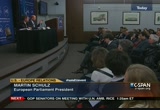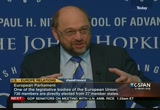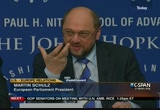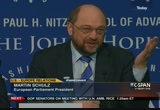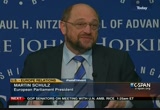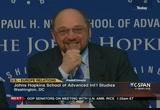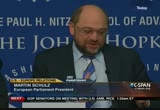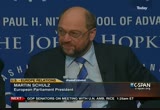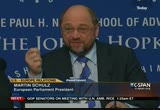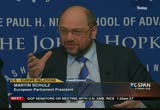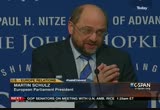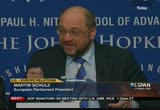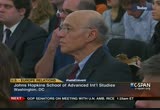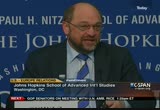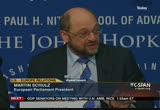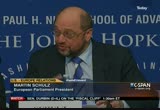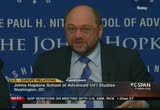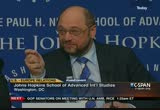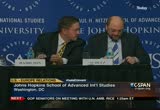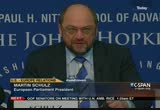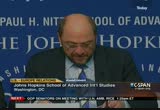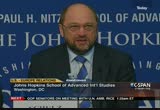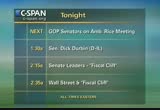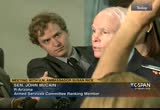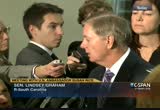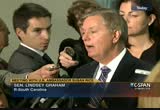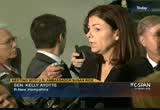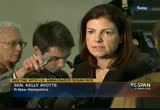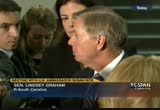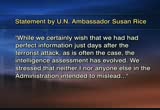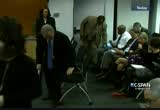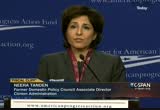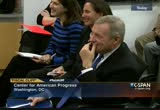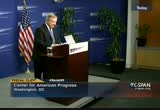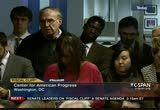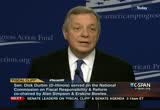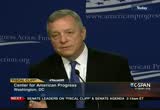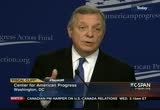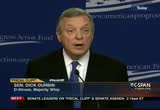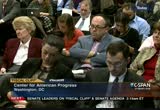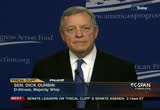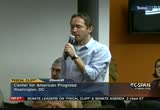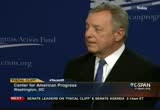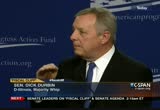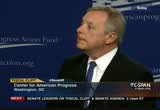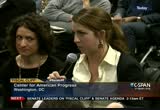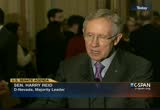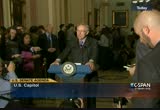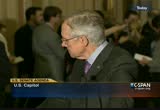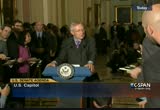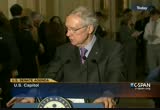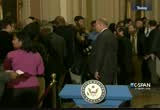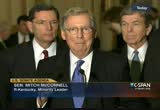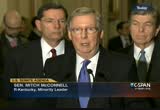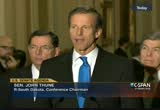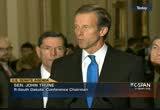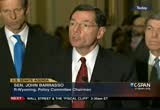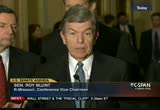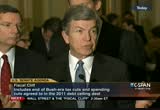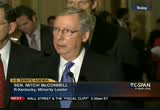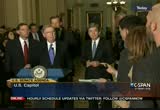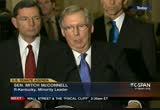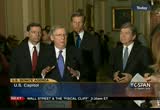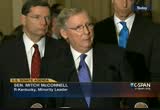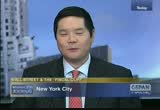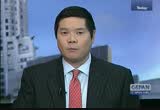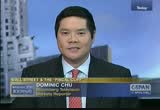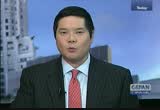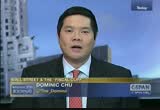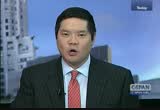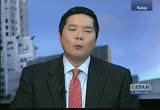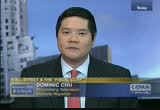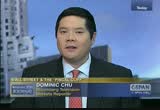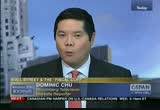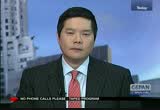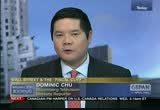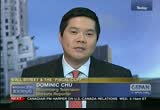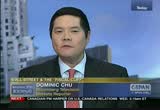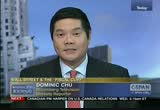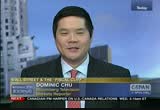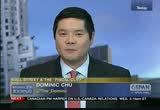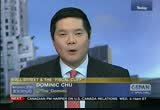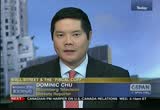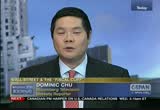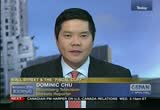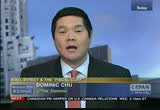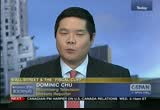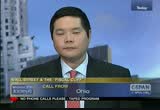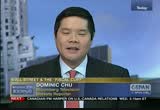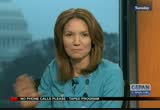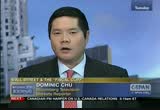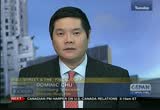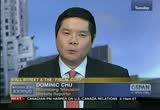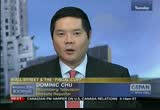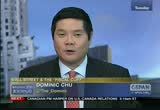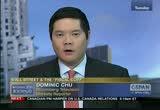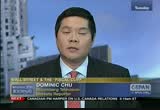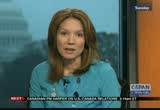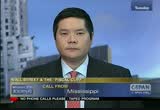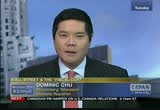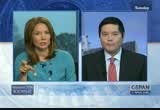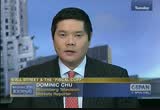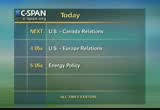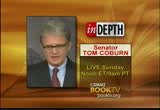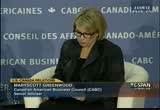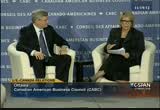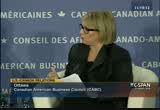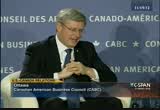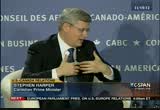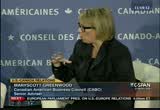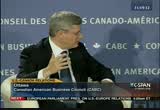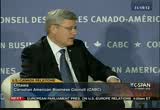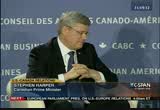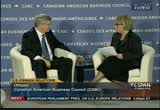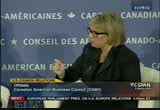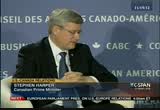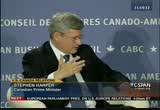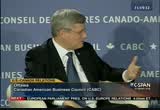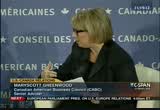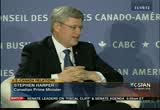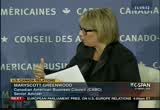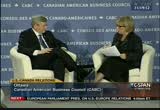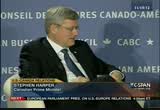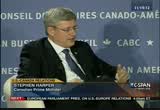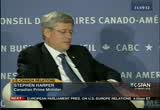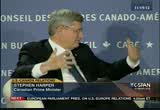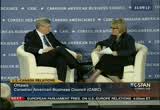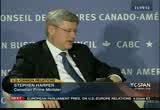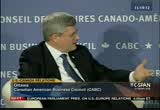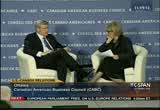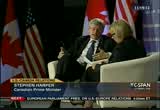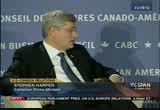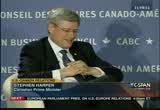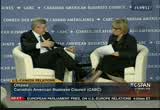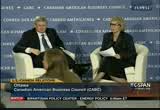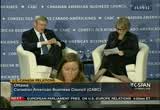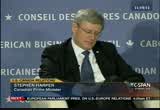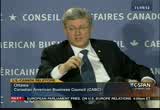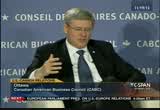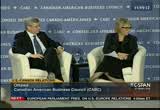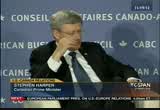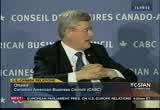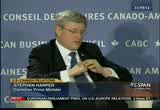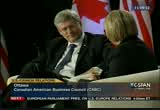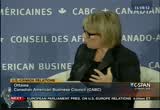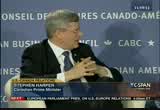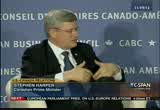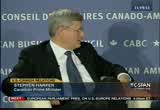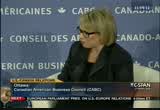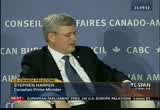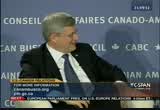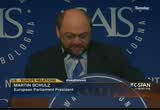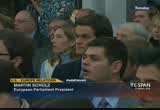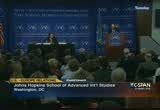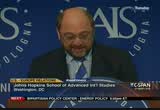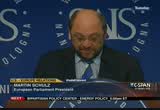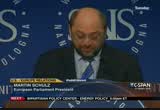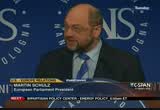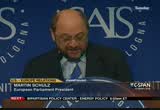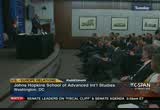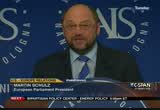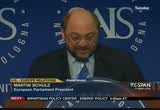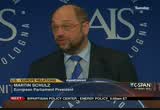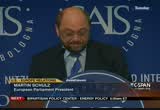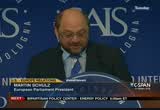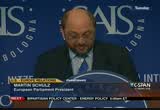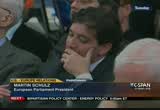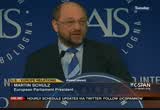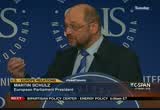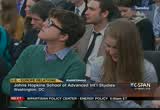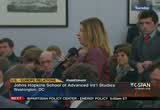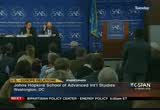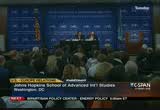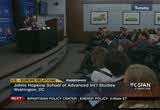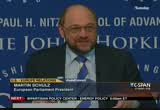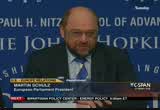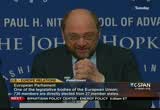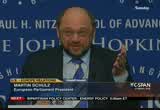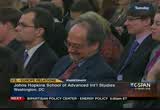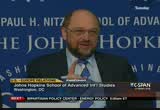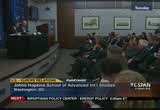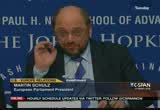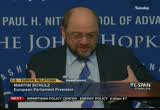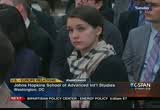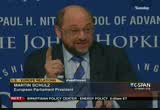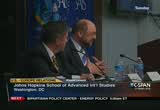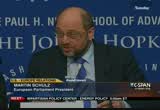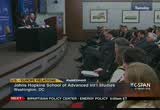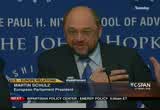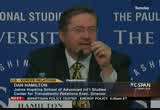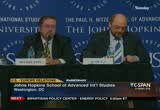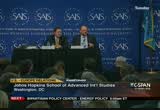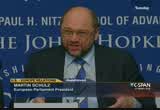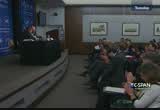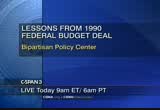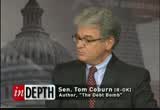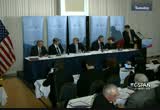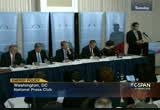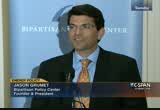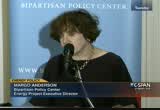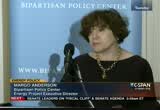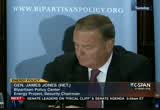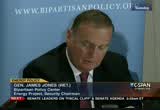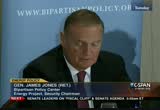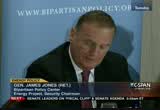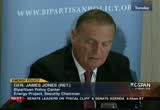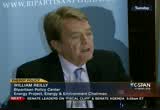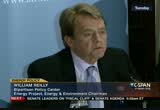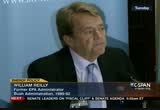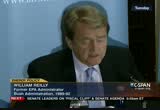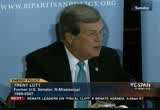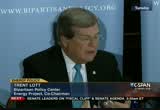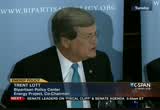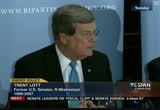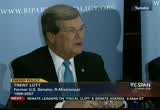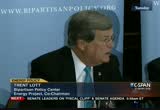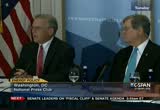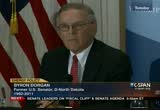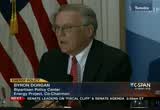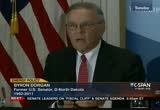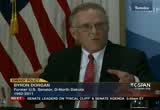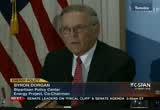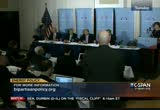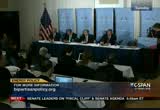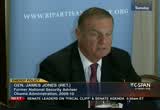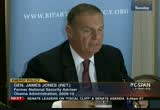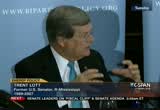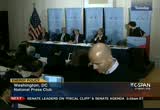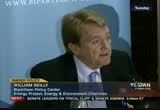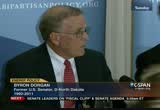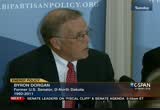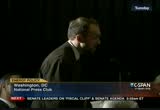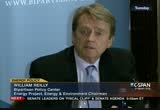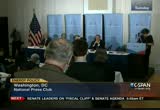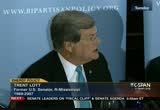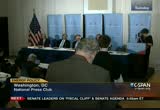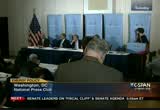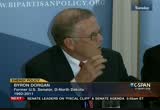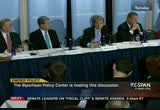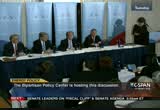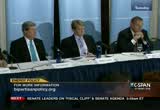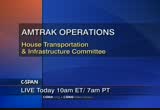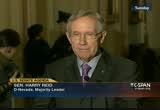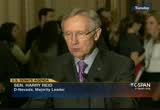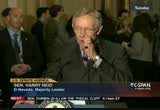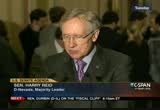tv Capitol Hill Hearings CSPAN November 28, 2012 1:00am-6:00am EST
1:00 am
european union to open negotiations for access need a unanimous vote. i think the teams in december 2008, the negotiations were open. all governments must agree. and all agreed about opening negotiations with turkey for access to the european union. the day after, some of the heads saidate the government's this is the and the opening of negotiations with an open end. my understanding was it was the opening of [indiscernible]
1:01 am
this is an explanation for the political crisis. the european union has not solved the problem that it is a community of a federation of separate states. it is undecided what it is, is it a federation or is the day assembly of separate states? this is the major problem of the european union for the time being, this and salt structural question. this plays a major role -- this unsolved structural question. at the end, you need all people on board to give access to country. the problem with the european union is, because you need it to be unanimous, concerning
1:02 am
macedonia, you know your neighbor has enormous problems with the name macedonia. but in macedonia, we should be honored. i had the biggest hope that macedonia could become a wonderful example for a multi ethnic, a country with a multi- ethnic society and the constitution as a basis for mutual respect of the different ethnic in the country, and the kind of political system, reducing the differences by defining common goals and working to achieve a common goal. this was more or less the spirit of the agreement. i must take note that this commitment of both the ethnic
1:03 am
groups and the name problem is unsolved, so i cannot make a lot of hope today. the situation is pending an unsolved. nevertheless, it is the same as it is for cosimo or bosnia. the first of july, croatia will join the european union. it is absolutely impossible to say no to the other former countries of the former republic of yugoslavia. this is not only a question of readability, it is historically impossible to exclude these countries from the european union. bafta stick to the promises they made to fulfill the criteria of
1:04 am
copenhagen. i must admit i am reluctant to say that development is going in the european direction. i have another feeling. the european union, concerning kosovo, nevertheless, there are five member states of the european union not recognizing kosovo. five of the member states -- you see how difficult our political system is and how much reforms are needed. how to move europe away from austerity. if i would be it social democratic politician, i could
1:05 am
make a wise speech. i must be more reluctant with my wise speeches. >> come back, we will look forward to that. [laughter] we offer asylum. >> i think more and more governments understand that one- sided austerity measures, economic recovery is impossible and growth cannot regain. but the conditions known for economic growth in the last three years -- then the
1:06 am
investors will regain trust in the european union. to regain trust, investors in the financial markets and the real economy, you need sustainability and credibility. the problem with the european union for the time being is that decisionmaking is not sustainable. the united states has a common economic area with a common currency. one central bank, one parliament, and one government. the european union has an economic area with one currency, one central bank, and 17 governments in the eurozone. how the fine trust when you have every day after the decision
1:07 am
making, another government -- how you can find an investor going to greece, today you invest in euros. tomorrow, the currency of greece, nobody knows. what kind of investment will go to greece. the biggest problem is not to fill the gap in the public coffers of greece. my eyes, it is a credit crunch in some of the countries. i met the chairman of the greek chamber of commerce when i was there and he'd tell me we have about 300 small and middle sized companies. ferry transport is a very important element of the greek economy. in the health-care system,
1:08 am
whatever. most of the jobs are created in small enterprises, not in the big plants. he said to me, we have one problem, we get no credit. no greek bank can give us the credit. this is the thing in spain and italy, the credit crunch is one of the biggest problems. my proposal is to go away from austerity by gaining trust by overcoming the credit crunch. and i think at the end, by helping those countries who are nevertheless under the attack of speculator.
1:09 am
in the case of italy -- i must admit this is not possible because you need unanimity. it makes no sense that mario monti in italy wants to get a reduction of about 70 billion euros an effect in the budget, three or 4 million a year to finance the separate debt. this is a direct transfer of taxpayers' money into the pockets of speculators. i think the obstacles for the
1:10 am
free-trade agreement are enormous. especially on the european side, in my eyes is more ideological founded than it is an expression of an approach. we have some justified question concerning the climate change question. we must be clear, the chance for us to recover is to boost growth worldwide. countries like china or india, in the asian community, or even less in america, on their way to
1:11 am
the same style of life we have, the same energy, the same co2 emission. the end of our planet is possible. but there is an enormous chance for us. what they need our products with lower energy consumption. what they need our energy efficient products. who could better develop this than the united states and the europeans, in cooperation together. to combine innovation on climate change with industry and production. that is possible, but only if we are live. therefore i am in favor of a
1:12 am
trade agreement. asked what other obstacles there are. a lot of europeans doubting, but i saw better ground here in the united states, in ohio, and i saw for the first time in a swing state, the co2 question played a major role in the election concerning the coal mining question. to avoid any other misunderstanding, i know what it means to close a coal mine for 35,000 inhabitants, most of them employed in the coal mine. when you close down the coal mine, it was an economic disaster. but today, the coal mine is closed down and you have an economically flourishing city.
1:13 am
so it is possible to step away from a traditional industrial structure, with public financing and support to go into another direction. therefore we need more money in the european budget. [laughter] mali and congo, i set a lot about our common commitment, and where the values are challenged, wherever terrorism and terrorist groups try to destroy countries, to bring countries to the state of a failed state, as a basis for terrorist groups to
1:14 am
export their terrorism, we must act. somalia is a symbol. what is happening in mali is a direct result of the libyan revolution. it is now distributed in the whole region. not only mali. a at a meeting with the king of morocco to tell me that for his country this is one of the biggest risks. this is not only a local conflict. concerning congo, this is an honest risk for the country, the split of the country.
1:15 am
congo is another real, bigger challenge. we are willing buyers to accept what is going on, and if they are able to solve the problem, i think we should support the africans first of all who try to solve their problem with their own transnational community's existing. the western african union and all this society of countries. trade is an explicit response ability of the european union. the germans are very proud
1:16 am
about that torchmark. we no longer have sovereignty on currency. we created in europe a transnational sovereignty, but we did not provide the european union with the necessary constitutional means this is a kind of frankenstein europe we created. therefore, my answer is, we need a european government. set in office by parliament and in the case of poor performance, replaced by another government. election should be a competition between programs and people. in the treaty, it is foreseen
1:17 am
that the next president of the commission is appointed and elected by the european parliament in the view of the outcome of the previous european election. that means the next president needs a parliamentarian majority. the election campaign for such a majority will change completely the character of european elections and change the character of the european union. it is not a result of an agreement -- but he gets his post and his legitimacy by a parliament as a result of a parliamentarian election. >> wearying close to the end, but i want to be fair to our colleagues -- we are getting close to the end.
1:18 am
if we can get a very brief question and answer. >> you have been waiting patiently. can we hear from bologna? a little louder. go ahead. >> the mobility of individuals is quite low. how can you work to improve the unemployment rate in greece and spain? >> is pittsburg there? >> i am from the university of pittsburg. i wonder if you could speak
1:19 am
about cooperation that could exist between europe and the u.s.? it seems like the u.s. has to deal with the fiscal cliff and there is not much room for mutual influence. if you don't have your house in order, you cannot speak to our problems. this does not covered in our media very much. >> thank you. let's go to illinois. we have the votes from the judges. >> can you guys hear me? what can parliament do to encourage [indiscernible] >> thank you. we will go right to the answers.
1:20 am
>> you the unemployment, i spent a long time in entering what could we do to regain trust and growth. i made a proposal, and i repeat it. the european union, together with the states in which the youth unemployment is so crop -- so great, we should support those enterprises who employ young people with direct support financially for the enterprise, or with privilege and taxes. those are the two possibilities, but we should do it. the fight against unemployment, in my eyes, is the highest priority for the european union,
1:21 am
or must be the highest priority for the european union. the international labor organization spoke about the lost generation in such countries. to lose a whole generation from a society is to destroy democracy. therefore, if there are not direct places for young people, we must intervene directly from the state level to support those enterprises to employ young people. i could tell a lot more, but i was asked to do it shorter. both sides have a lot of economic and political problems, but we are solving the problems. we must solve our economic and political problems and cooperate, and it is possible.
1:22 am
perhaps one problem is the lack of cooperation between the united states and the european union. to solve the problems we have, one step is to cooperate more. gender equality, the european parliament is one of the strongest fighters in the world for gender equality. i can tell you for a lot of men and women, perhaps more women than men, but for a lot of them, one of the highest priorities is political engagement in the european parliament, which was visible just recently in the case of the appointment of the luxembourg representative, reduced by the european parliament because it was not a gender equality respecting proposal. >> you see all the skills that
1:23 am
martin schulz brings. please join me in thanking him for being here with us. >> in a few moments, senators talk about their meeting tuesday with un ambassador susan rice. senate majority whip david gergen on negotiations to work an appeal on the so-called fiscal cliff. after that, more from senate leaders who spoke with reporters after party lunches today at the capitol. later a discussion on how wall street investors are preparing for the possible tax hikes and budget cuts. now, republican senators on their meeting with you in ambassador susan rice on the attacks in libya that killed four americans.
1:24 am
>> a very candid discussion with the director of the cia. we are significantly troubled by many the answers we got. the evidence was overwhelming leading up to the attack on our consulates. whether ambassador rice was informed sufficiently is a correct depiction of the events that took place. but the intervention was incorrect when she said it was a spontaneous demonstration. it was not, and there was
1:25 am
compelling evidence that the time that that was not the case, including statements by libyans as well as other americans. mortars and rocket-propelled grenades were not spontaneous demonstrations. >> i think it does not do justice to the reality at the time and in hindsight, -- in real time [indiscernible] anybody looking at the threat in libya, it would jump out at you.
1:26 am
i am disappointed in our intelligence community. with a little bit of inquiring and curiosity, and think it would be pretty clear that to explain this episode as related to a video that created a disturbance that turned into a riot, at the end of the day, we are going to get to the bottom of this. we have to have a system that would contrast. you don't know what happened, just say that you don't know what happened. people keep pushing to give explanations, and you can say i don't want to give bad information. here is what i can tell you. the american people got that information from president obama days after, and the question is, should they have been given the information at all? if you can do nothing but give
1:27 am
that information, then it is better than no information at all. my belief is, not only is the information bad, and i am more convinced than ever that it was bad, it was unjustified to give the scenario as presented by ambassador rice and president obama three weeks before an election. >> i want to say that i am more troubled today, having met with the acting director of the cia and embassador rise, but because it is certainly clear from the beginning that they knew that those with ties to al qaeda work involved in the attacks in the embassy, and clearly the information given to the american people was wrong. in fact, ambassador rice said today absolutely it was wrong. i don't understand the cia said
1:28 am
clearly that information was wrong, and they knew by the 22nd that it was wrong. they have not clear that up with the american people, and coming forward in saying they were wrong, including the president of the united states also talking about the fact that it was a reaction to the video. what troubles me also is that obviously the changes made, the unclassified talking points were misleading, but just to be clear, when you have a position where your and ambassador to the united nations, you go well beyond classified talking points in your daily responsibilities, and that is troubling to me as well, i am a person that got -- does not know anything about this and i am going on every single show.
1:29 am
is part of our responsibility as an ambassador to the united nations to review much more than that. >> before anybody could make an intelligent decision about someone involved in benghazi, we need to do a lot more. we don't have to see the fbi interviews of the survivors to know that -- will have the basic information about what was said and shared in congress as of this day. i remember the episode very well. it did not have the information to make informed decisions about john bolton the ambassador, and democrats dug in their heels saying we are not going to vote or consider this nomination until we get basic answers to our concerns. all i can tell you is the
1:30 am
concerns i had are greater today than they were before. we are not even close to getting the basic answers. >> i have many more questions. >> after her meeting with the senators, un ambassador susan rice released a statement that said in part, while we certainly wish we have had heard it -- perfect information this days after the terrorist attack, as is often the case, the intelligence assessment has the ball. we stress that neither i nor anyone else in the administration intended to mislead the american people at any stage in this process.
1:31 am
>> dick durbin says that as talks continue on the so-called fiscal cliff, democrats must be open to what he calls painful topics, including medicare and medicaid. he was at the center for american progress for about 45 minutes. >> good morning, everyone. thank you for being here. i am the president of the center for american progress. we are thrilled to have senator durbin here today to talk about his views on the fiscal cliff. as we engage in this debate, i wanted to lay out a few principles that are critical as
1:32 am
washington becomes obsessed with this set of issues. the elections have consequences. at c.a.p., we have argued that the issues that are really framing the fiscal debate and fiscal cliff were ones that were litigated in the election context. the president did not have one set of conversations before november and a second set now. there was a thread going through the debate that the country was having and that thread was around having a balanced plan to address america's fiscal challenges. there are serious fiscal challenges that we do need long term -- deficit reduction -- that is important to america's credibility. it is important for america's economy and economic growth. that plan has to be balanced, and that means significant revenues and that paying has to
1:33 am
go around. that means the wealthy and well-off have to pay their fair share as well. these should not be new issues. they are ones that were debated. they came up in every debate -- even the foreign policy debate. the american people are on the side of the president and democrats who are making this case. that is not to say that there should not be spending as part as this debate. there has been over $1 trillion in spending cuts. that is a part of this debate that gets lost. just because washington has a short memory does not mean we should all have one and that there has already been sacrifice on behalf of the american people through those domestic discretionary cuts. we are excited.
1:34 am
c.a.p. has been a lot of work on the fiscal cliff. we have talked about medicare savings that can improve and strengthen the program and address rising national health expenditures. we will have more to say on the issue of taxes. we are ecstatic to have senator durbin here today, who has played a fundamental role over the last several years. he has been part of every negotiation that has taken place. he is still an optimist. that is a sign of progress. he has had a long history of being a champion and advocate for the middle class. he has carried that advocacy in the budget negotiations. he was part of the supercommittee, this fiscal, the gang of eight, the gang of six -- almost every gang that has been involved in these issues. he has been a fighter for what is right and for having a plan
1:35 am
that stands true to the values of the american people and the people who voted and waited in line for hours on end to vote -- people who want a fair shake out of washington. as a champion of that fair shake, i am excited to have senator durbin. >> neera, thank you very much for those kind words. it is good to see you. thanks to the center of american progress for the all the work you do. elections have consequences, and politics is driven by a lot of things -- candidates and money -- but many times it is by ideas and issues. the center has been on the forefront of this effort to make sure that progressive ideas are backed up by more than just feelings of the heart but
1:36 am
arguments of the mind that are compelling and persuasive. thank you for doing that. i do not know what we would do without you, and it is an honor to be here with you. i have been involved in a lot of gang activity. it started with harry reid appointing me to the simpson- bowles commission -- 18 members. i thought this was another commission who'd work product would be lost in history and on a dusty shelf or buried in some hard drive. it turned out to be a historic effort and a game changer -- mainly through the good work of erskine bowles and ellen simpson with hard work that was put into this by 18 members, evenly divided among house and senate democrats and republicans and six public members. 11 of us voted for the final work product. i was invited to join the gang of six to continue the conversation on simpson-bowles. it expanded to the gang of eight. the conversation has been going
1:37 am
on for two years. that is a lot of popcorn in mark warner's office. it was a great education and effort to sit across the table from conservative senators and talk through not just the reality of the deficit but the political reality of the deficit, which we have to be more sensitive to if we are looking for an honest solution. some of my friends on the left came to visit. i recall one -- the labor leader who said -- what is a nice progressive like you doing in a place like that? why are you hanging with those people? they are up to no good and they are not going to do the things you go elected to do. i disagree with this person. i said -- given the choice between attending a press conference with you, walking outside, walking outside with a sign, or being seated at the
1:38 am
table, which do you think is a better place for me to be? she paused and said -- stay at the table. that is the reason i have been there because i have a role to play -- a voice to add that is not going to be there otherwise. just by way of background -- a little bit -- dave copperfield here. i ended up in politics thanks to two paul's -- paul douglas and paul simon. douglas was my first person i met in politics, a u.s. senator -- an extraordinary man who served until 1966. i was a college intern in his office. he used to say -- you do not have to be a wasteful to be a liberal. i think we would say -- you don't have to be wasteful be he was much more literate than me. paul simon is well known as a progressive liberal. he was also a strong supporter of the balanced budget. i happen to agree. i believe what we face now is a
1:39 am
threat to our country, to our budget, at every level. the money we are borrowing to sustain our government is money borrowed to sustain food stamps as well as the pentagon. we ought to be thinking of that in terms of our values and our future. let me speak to a couple of elements here that i think progressives should keep in mind. progressives cannot afford to stand on the sidelines in this fiscal cliff debate. important critical decisions will be made soon that will affect this country for 10 years. i think we need to be a part of this conversation. we need to be open to some topics and some issues that are
1:40 am
painful and hard for us to talk about. we cannot stand by the sidelines in denial that this is ever going to engage us in the things we value. we cannot be so naive to believe that just taxing the rich will solve our problems. i believe that is an important part of a solution. we have to look to reform and change that is significant, that preserves many of the values and programs that brought us political life, and we cannot believe that merely ignoring these programs or not engaging will solve the problem. pick up any of the newspapers and look for the full-page ads and you will see on a daily basis organizations that we respect and are engaged in political campaigns, buying ads basically saying to the left, keep your hands off entitlements and to the right, keep your hands off of texas. if both sides heed those warnings, nothing will happen. it is better for us to engage
1:41 am
with basic grounding in values and principles. let me tell you what i mean. first, i start with the premise we need to preserve and extend productivity in the tax code. the lesson is clear. we know what happens in middle income families and those making less. they are falling further and further behind. what the president has proposed and what the senate has passed, the $250,000 protection, that is significant. if we do not protect those families from the fiscal cliff, they will see their annual taxes go up $2,000. it will be noticed. it should not happen. i hope the house will take up the president's challenge an invitation and pass the senate
1:42 am
bill to protect families making less with one vote, they can avert the fiscal cliff for 98% of american families, at least when it comes to income taxes. it is necessary. we know what has happened over the last several decades. it is the worst it has been in almost 90 years. between 1980 and 2005, in the 25 year time period, more than 80% of the total increase in america's income went to the wealthiest. 90% has got to the top 1%, the
1:43 am
median income of the middle class has declined. i could go on and give illustrations. i do not think i need to to this group. when we address the issue of revenue in taxes, i insist in every meeting i have been in that it needs to improve it for low income categories. that is the starting principle for those of us who are progressives. the second thing we must insist on is to protect the safety net for america. make no mistake. as good as we are, there will always be people in this country who will need a helping hand. because of a physical or mental deficiency. they will need a helping hand. or just the economic circumstance they find themselves in. i went to a food bank last year. i was in a warehouse and i took a little tour. there was a nicely dressed young lady there. i watched. i thought she must be on the board here. i talked to her. she talked about her kids. to work for the local school district. she was glad to have her job. it did not pay enough money.
1:44 am
she was a single mom with two kids. she said, i want to thank you that the program lets me take my kids to farmers' markets. it is a great thing for fresh fruits and vegetables. they get to talk to farmers. here is a woman trying her very best to need a helping hand. months ago, i was at a methodist church food pantry in chicago. i ask the lady she was on social security. a hundred dollars a month. i said what your rent and utility costs come to? $600. i asked her how she makes it. she says, i come here and they give me three days worth of food each month. she says, and i get food stamps worth $37 a month. that is the reality for many people struggling. as well as those who are tired and in the impoverished state. at the end of the day, when we
1:45 am
talk about our budgets and deficits, we have to make sure we do not look the obvious, that is that the safety net is essential for our future. the third element i would like to make is a guided principle that we have got to keep our recovery on track. it is absolutely essential that this recovery, which is moving forward slowly, continue to move toward. we know if we are not careful, it will stop economic growth and hurt everyone through every income category. we have got to make sure as we phase in a deficit reduction, we are mindful of the economic recovery we are dealing with. that is essential. i hope my friends at fox are sitting down when they hear this. it may come as a shock. president obama did not event trillion dollar deficit. he inherited them.
1:46 am
the day he took office, we were in a freefall. despite extraordinary steps needed to do with a great recession, the deficit has decreased every year for the last three years, from 10% of gdp in 2009 to 7% of gdp today. the source is not the democratic national committee, but a respective publication. it has fallen faster over the past three years than it has in any stretch since demobilization in world war ii. after that, the only time the deficit has fallen faster is when the economy relapsed. the article went on to say, if u.s. history offers any guide,
1:47 am
we are already testing the speed limits of a fiscal consolidation that does not risk backfiring. that is the point i am making. let us be careful as we implement deficit reduction that we are sensitive to the recovery. we do not move too quickly. now comes the basics. i go back to simpson-bowles. i think they have it right. put everything on the table. not only taxes and revenue, but spending cuts and entitlement reform. let me speak about each of them. first when it comes to revenue. so many people who talk about simpson-bowles. it relied on revenue for 40% of the deficit reduction over a 10-year period of time. it is understandable when you read the report why they said this.
1:48 am
if you look back to the last year when we had a balanced budget, you will find at that point in time, our revenues reflected 19.6% of our gdp. our spending reflected 19.6% of gdp. where are we today? you get different estimates. warren buffett said 15.5% yesterday is coming in as revenue. i have heard lower figures. that is the reality of what has happened. we have seen a decline in tax revenue and an increase in spending for a variety of reasons. if we are serious about deficit reduction, we have got to move back the golden 19.6%.
1:49 am
let's talk for a minute about what has happened. the chairman of the appropriation committee. let's take a look at where the art today compared to where we were in fiscal year 2001 when the federal government ran a $128 billion surplus. compared to the 2001 figure, we are spending less on non- security concessionary spending than we were. the growth in spending has not been in the non-defense discretionary. the cost of security programs in that same time period has gone up 60%.
1:50 am
1:51 am
minute. the budget control act and sequestration would result in dramatic cuts to spending. we have heard a lot of talk about the impact it will have on our national defense. to believe that having ended one war in iraq and ending another in afghanistan that we cannot find savings in the pentagon, i do not think that is a fair assessment. there are savings to be had that will not compromise our national security. the simpson-bowles commission approach established in the outer years to lay the temptation to go back into the non-defense accounts when too much political pressure keeps you out of defense spending. i would hope any long-term agreement would improve that. on the non-defense side, i think there are savings to be
1:52 am
found. a hats off to debbie and pat roberts putting gather a reform bill that saves us money in the next 10 years. that is something that hits my state. there are other areas where savings can be found. we need to look at those honestly. i think infrastructure is one area which we should consider a revenue source toward an infrastructure bank. we are not spending enough or investing enough in the infrastructure of america. today, china invests 9% of its gross domestic product in its infrastructure.
1:53 am
europe, 5%. america, 2.5%, barely enough to sustain and repair what we have in place. there are no grand visions i had about infrastructure and there should be carried beyond the obvious of highways and airports, we have to be thinking about our energy infrastructure in this country and whether it serves our economy well. we have already seen thoughtful suggestions on on both sides of the aisle. when it comes to spending and future, we need to be thoughtful about ways to fund infrastructure. many of you saw the article recently in "the washington post." i want to give a belated thanks to the soviets for launching sputnik and schering americans. because of it, there was a program that got me through college and law school. these loans make a big difference, whether it is pell
1:54 am
grants or loans. let me look at this honestly. 25% of the federal aid education goes to for-profit schools. they have more than double the student loan default rate than any other. there are ways to cut back on spending and education that will give us opportunities and resources for real education, which can be part of our future. when it comes to the most painful topic of all. i came here in 1983 and was told social security would be on its way out. we rolled up with our sleeves
1:55 am
and came up with a bipartisan solution that ultimately bought over 50 years of solvency for social security. we raised the retirement age, payable taxes on social security, and we taxed those social security benefits indirectly for the first time. today, social security will make every promised payment for the next 22 years. you cannot say that about much in washington. social security has not added one penny to the deficit. for those who say there is good reason to push it off the table and wait, i would add a note of caution. small changes made today in social security will play out over the long run to buy us solvency for a long time. we should take perhaps all the security off the table but be very honest but we will achieve in the near term.
1:56 am
i think we should create the equivalent of eight simpson- bowles region of a simpson- bowles, and come up with a plan to buy 75 years of salt with the rigid of solvency. i might add a wrinkle here. every 10 years, a similar commission ought to be created. let's not get into this mess where we have six months to go with social security. you know how important it is for people. people are devastated by the recession and their pension plans lost. it is important to us, our kids
1:57 am
come and grandchildren. i think we should create a commission that will report back to congress before a vote by the end of the next calendar year. i want to talk about the two toughest elements when it comes to entitlements, medicare and medicaid. represent about 20% of our budget. they are a real challenge to us. untouched, and amended, medicare will run up money in 12 years that is scary. we have so many americans who count on it. almost 50 million americans and the number is growing. yesterday, in america, 10,000 reached the age of 65. it will happen tomorrow. it will happen every day for the next 18 years. these are people who paid in over a lifetime and expect the
1:58 am
protection they have invested in to be there. asked to be there. we need to take an honest look at medicare. i believe the paul ryan approach was not the right approach. i thought his idea of premium support would raise the cost of medicare is turned on many seniors. i think it was unworkable and did not support. some suggest raising the medicare retirement age. i have trouble with that. my trouble is in my family, i have an older brother who passed away a few years ago appeared when he retired, he had health insurance from his employer and then had a massive heart attack and surgery. they canceled his insurance. my very conservative republican brother, who had no use for a social program, started counting the days until he was eligible for medicare. that was the only place he could
1:59 am
turn. what was at stake were all the savings he put together for his family. if anybody wants to talk about a later eligibility age for medicare, what i want to hear is the assurance and guarantee that people like my brother will have access to affordable health care insurance during any time. until i hear that, i am skeptical. i want to see more before i go forward. when it comes to medicare, there are savings to be had. savings that were brought up by the bowles-simpson commission. i will not go through them in particular. savings that will not compromise the care to beneficiaries but can lead to real efficiencies and the delivery of health care. medicaid is a special case as far as i am concerned. when i mentioned social
2:00 am
security and medicare, i know organizations in this town who are deeply committed to those programs and are very politically articulate. they are involved if not with money, certainly with vote. members of congress pay close attention to them. medicaid is an illustration from the state of illinois and means the following. it is the only health insurance for one out of three childrenite for one out of three children in illinois. it pays for more than half of the births in illinois. that is not even half of the cost of medicaid in illinois. 60% of the cost goes to take care of the elderly, frail, and disabled. many of them in institutional settings, flat broke. all they have is social security, medicare, and medicaid. when the ryan budget suggests block granting medicaid back to the states, and essentially cutting the money by 37%, my question to him and people on that side is, which group do you want to reduce coverage by by one-third and what will the
2:01 am
consequences be? let me tell you what i think the good news is. i think we will get this done. i am heartened by many of my republican colleagues who have stepped forward and said their real oath is to america and not to a washington lobbyist named grover norquist. that is politically courageous. many have already said this. i respect them so much for it. as more do, it will create an environment for us to reach an agreement. we need the same willingness to step 4 on the left to be able to meet in this room at the table or wherever the room maybe and to come to an agreement that
2:02 am
will lead us forward. one thing i am hoping for is if we can reach an agreement, in principle before the end of the year, then implement it, i believe this is what many have been waiting for to launch a more spirited recovery. if we get this done, if we have a credible $4 trillion deficit reduction plan signed and sealed, signed by the president, what does that say to the rest of the world? many economies in europe and other places are struggling, but ours will be the strongest in the world in terms of the future. it takes a lot of hard work but it is worth the effort. all will prosper. saturday night, my wife and i went to see a movie by spielberg. about another gentleman who lived in illinois for a while named abraham lincoln.
2:03 am
toward the end of the movie, daniel day-lewis was sitting across from confederates and there was talk about what the war was all about. you had seen all the death and division across america. at one point, lincoln said, it was about proving that democracy is not chaos. in those days, the cost of that group was 600,000 american lives. thank goodness we do not face anything like that. but we face the same challenge. i do not know if there was a mandate that came out of the election, but there was a work order to get to work and do it together and get the job done. i think we can do it. those of us on the left on the progressive side can make a positive contribution. [applause]
2:04 am
>> thank you for those remarks. we do have time for questions. questions from the press first. wait for the microphone. >> i would like to know the negotiations in 2011. i was wondering what you think what the president should have drawn from those? >> they really orchestrated this well. we spent an exhausted year going to the possibility. then they put a drag on the table. it was nicely done. each of us were visited and asked what we think.
2:05 am
i said, i cannot vote for that. there are six things here that are showstoppers as far as i am concerned. i will fix those things or i am voting against it. he writes down those things and leaves. the next thing that happened was we did not have an amendment process. we had a final draft. four or five of the six were taken care of. i voted for it. it takes leaders who are willing to sit down and make compromises and listen. in this case, the negotiation is directed between the white house and speaker boehner. there is no better person for the president to sign for the job, i have known him for years and i have the highest respect. i hope speaker boehner will agree to one basic principle and i think we can get this done. the solution on the house side will be bipartisan.
2:06 am
have to be in the senate. it this will be an exclusive republican solution on the house side, i am afraid we will reach the same impasse we have had in the past. if he will make a commitment to a bipartisan solution, i think we will get this done. >> over here. >> you mentioned medicaid is a special case. does that mean there are no savings or are there and what would they be? >> there are. it is a special case because of the political circumstance. the people served by medicaid are not politically powerful. they are the poorest of the poor. they are not in a position to speak for themselves. that is what i meant. there are ways to save. simpson-bowles goes through a list of possibilities.
2:07 am
one is something every state has tried. it is a nice move to come up with more state funds, but it has got to come to an end. that is a bit of a trade. the dual eligibles. if people are eligible for both medicare and medicaid, the reimbursement for services and pharmaceuticals and others will be in a medicaid level, a lower level of reimbursement. i think there are ways to do this.
2:08 am
the waiver process here can be helpful. we can learn some things. we talked about experimenting as we went through the affordable care act. the hospital has a checkered history. under our new president, they ask for a waiver so they can take the new medicaid population that will come on board and get to them early, established preventive care and medical homes for these people. i think this will be a real money saver as we start thinking about early interventions and coordinating care for people who are chronically ill and very expensive if they are not cared for. >> you also talked about investment and infrastructure, renewable energy, are you calling for a specific language that would involve these types of investments? >> if we were going to put limitations on spending, which is likely, there has got to be room within those to build this economy. we cannot reach the point where we are mindlessly cutting right and left. there are some things that really do create jobs and opportunity and growth in our economy. education, infrastructure, research, those are the basics i would try to fund.
2:09 am
what i suggest, going back to simpson-bowles, is finding a revenue source that will help us build an infrastructure bank. we have got to come at this differently. relying on a larger and larger share of general revenue to fund it has become a problem. it is better to find a self- funding mechanism. >> in your remarks, you mentioned the affordable care act. you say you do not want it gutted or repealed. you did not mention it in these remarks. where are you on reopening it at all?
2:10 am
is there any money to be had from other parts that would leave it largely intact? >> i apologize to you and my speech writer for not going through every page she had written with my approval. i fully incorporated by reference every word of it. here is what i think. this election made the decision that we are going forward as we should. i think it is the most important vote i have ever cast in terms of long-term economic health and liberal health of america. what i said before i will say again. the only perfect law i know it was carried down on stone tablets by senator moses. everyone realizes changes have to be made over time to the law.
2:11 am
will they create competition and price limitation as a result? is the premium support we are offering to families making less than 400% of poverty going to be adequate for them to still by an insurance from exchanges? we will learn this going on. the one we know for sure is if the other party prevailed, we would be in the sewer. i am open to whatever elements we need to reconsider their. we have got the right starting point. >> the senator has time for two more questions. >> do you anticipate republicans will demand more deficit reduction on top of what they are already asking for in exchange for raising the deficit, which we are expected to hit? is that already accounted for in the $4 trillion ultimate grand bargain? >> the first thing we have to
2:12 am
2:13 am
$9 trillion. thomas has a big deal about where we need to go. we have talked about $5 trillion. i think it will be closer to $4 trillion when it is all said and done. i think the president will not sign off on any agreement that does not include some certainty as to budgets, appropriations, dealing with our debt ceiling. we will not find ourselves with some big party celebrating in february and turn around in march and have another doomsday scenario. we have got to get this done as a package. i think we should. >> the final question right here. >> i was hoping you could weigh in on the present's strategy. he is taking his views directly to voters. related to that, together with the house republicans saying they will go out and have their own event, a sign? >> i do not think they stalled. we are playing ping-pong up here and rolling bowling balls under the table.
2:14 am
there are different things at different levels of activity here. what i think is happening, the real talks are underway between the speaker's staff and the president's staff to see what we can come to an agreement on. in the meantime, i think the president is trying to show what the polls already show us. 60% of voters who voted for him agree with the premise that the wealthy should pay more in taxes. 70% believe the taxes should be part of this whole solution. i know we have heard it and could give each other speeches about what we did here on the other side about small business. we will get an answer to that as well. the public debate will continue. the real work will have to be done on a person to person basis between the speaker pauses office and the president. i am more optimistic than most. i believe we can come up with the fundamentals in agreement before the end of the year and avert this fiscal cliff. >> as progressives, we have no better champion then who is at the table and part of the gang. thank you for joining us.
2:15 am
>> senate leaders spoke on tuesday. harry reid said republicans are holding up a deal on the so- called fiscal cliff. republicans said they do not understand why democrats are looking at changing the rules of filibusters. this is 20 minutes. >> we had a meeting with the four leaders up here at the white house, it went very well. the problem was that was before thanksgiving. and since that time, there has been little progress with the republicans, which is a disappointment to me. we only have a couple of weeks to get something done. we have to get away from the happy talk and start talking about specific things. and one month taxes are set to rise for all americans. we passed in the -- we passed in the senate a piece of legislation to protect people making less than $250,000 a year.
2:16 am
we have rejected on a bipartisan basis the republicans' efforts to extend the tax cuts for everybody. those are the two majors we have dealt with on the senate floor. if we fail to reach an agreement, the average middle- class family will see their taxes go up by 2,200 a year. as i have indicated, the senate has acted to stop that and the house is one vote away from making that a reality for many millions of americans. they could have prevented this crisis months ago by simply adopting by what we passed in the senate. we are happy to hear any ideas the republicans have. we recognize there are meetings going on all over town. i'm meeting with my three leaders in the morning, with some business people who are concerned about this, so-called big business and happy to meet with them.
2:17 am
i repeat, we only have a few weeks before the end of the year and we must do everything we can to ensure middle-class families are not hit with $2,200 a year in tax increases. >> senator reid, senator said in a speech today that medicare, medicaid should not be part of the fiscal cliff negotiations. should entitlements not be on the table? >> in the meeting i had with the president and the four leaders, president obama said social security is not what we are going to do on this and i agree with him. there are things that i personally think we can do with entitlements that don't hurt beneficiaries. but i'm not going to negotiate with you simply other than to say that we hope they agree to the tax revenue that we're talking about and that is rate increases and as the president said on a number of occasions, we'll be happy to deal with entitlements.
2:18 am
>> the congressional wisdom on a fiscal cliff deal does that include receive news and cuts. you made it clear how you feel on revenues. >> we have already done more than $1 billion worth of cuts, so we need to get credit for that in these negotiations that take place. >> senator durbin said he thinks that president obama won't include a deal - [inaudible] >> first of all, the debt ceiling. we would be foolish to work out something on stopping this from going over the cliff and then a month or six months later the republicans pull the same game as they did before and say we aren't going to agree to increasing the debt ceiling.
2:19 am
i agree with the president. it has to be a package deal. what was your other question? [inaudible question] >> there are things we have already taken care of, the first of april and take a look at that stuff. that's not essential. [inaudible question] >> we can't do anything with the disaster aid package and i'm told it will be tomorrow or the next day. [inaudible question] >> republican, ok. you said what's holding it up? i said republicans. talk to the republicans. it's up to them. [inaudible question] >> i have said on a number of
2:20 am
occasions the internet poker bill can move forward if we get 15, 17 republican votes. this stage, we have gotten none. >> you talked to the president over the weekend. are you hopeful, are you optimistic? >> i'm extremely hopeful. and i do not believe that the republicans are going to allow us to go over the cliff. i hope that's true. it is such a simple problem to solve. we have had experience. we know. we have had the biden-cantor talks, couple of rounds with boehner and obama, bowles- simpson and gray-conrad. and that's doing something with actual tax revenues. as romney proved during the campaign, you can't do it just by doctoring up the tax code.
2:21 am
that should be part of the deal. we need to have tax reform. we have to have the people who have done so well during this difficult time we have had with the economy. the richest of the rich will have to pay a little bit more to solve the financial problems we have in this country. [inaudible] >> good afternoon, everyone. as we head into the fiscal cliff negotiations, my advice to the president would be -- seems like our friends on the other side are having difficulty turning off the campaign.
2:22 am
we need to sit down and work this matter out. i think we have a clear sense and opportunity here at the end of the year to do something important for the country. we all know that the most critical steps to be taken are to save the entitlements, which are on an unsustainable path to bankruptcy. there's no better time to begin to fix that problem than right now. so i would hope our friends on the other side can kind of turn off the campaign and get into a cooperative mode here to reach a conclusion. which leads me to make a further observation about how unfortunate it is that the majority leader has chosen to create an extraordinary controversy here in the senate right here at a time when we ought to be encouraging maximum bipartisan cooperation, about threatening to employ the
2:23 am
nuclear option, which is to break the rules in order to change the rules of the senate. i hope cooler heads will prevail as we move through the process. we need to be working together. the election was november 6. we won't have another one for two years and it's time to start pulling everybody together as the american people expect us to do know matter how they voted last november to begin to solve this big problem. >> as the leader mentioned, the issues with regard to the fiscal cliff is pretty straightforward and the president in his press conference shortly after the election stated its his goal and priority, jobs and the economy. ought to be about jobs and the economy. republicans couldn't agree with him more which is why the proposal the president has put forward to solve the fiscal cliff raises taxes on a million small businesses who employ 25% of the work force and an
2:24 am
accounting firm has done a study has said if the president's proposal went into effect which is to raise taxes on the small businesses out there that it would cost us over 700,000 jobs and reduce take-home pay by 2% and reduce economic growth by 1.3%. what the president is proposing to do would hurt jobs and the economy, which is again, i ironic in that the president's only solution to solve our fiscal cliff issue is to raise taxes.
2:25 am
in 2010, we had the same debate. the president said you shouldn't raise taxes in the middle of a weak economy. at the time economic growth was 2.4 through the first three- quarters. this year, 2012, that same number is 1.8%. the economy is weaker and slower today than it was in 2010 when the president said you shouldn't raise taxes in the middle of a weak economy. we believe that the president has to lead on this issue. it can't be about raising taxes on people who create jobs in this economy if it is about jobs and the economy. and we all know what drives federal spending in this country is the entitlement programs. and we have seen no proposal from the president when it comes to reforming entitlement programs and getting them on a sustainable path. there is a solution out there, but so far, the president's only solution is to raise taxes on the very people that we're looking to to lead us out of this economic slowdown that we're in and cost us hundreds of thousands of jobs at the same time. >> the president says he is focused on jobs and growth and what republicans are committed to is providing good jobs for working families.
2:26 am
and one of the ways we are going to do with the keystone xl pipeline. we joined nine democrat colleagues to write a letter to the president to ask him to meet with us to focus on keystone xl pipeline. these are senators who are focused on getting americans back to work and this is a wonderful way to do it. talking about 20,000 jobs and the additional jobs related to the direct jobs of the pipeline. focuses on energy security, focuses on jobs and allow us to continue to produce goods and services in the united states. it is something that the president, if he truly is focused on jobs and growth should be embracing today and should not continue to delay. >> at the very time we ought to be finding ways to cooperate and
2:27 am
find a solution to the fiscal cliff, i really think that the majority leader has decided to needlessly kick over a hornet's nest. i like the house. i think it's open that the house function like the house. but it's important that the senate do the job the way the senate is supposed to do. you shouldn't turn the senate into the house and you shouldn't break the rules to change the rules. i don't think anybody has any doubt if they try to change the rules of the ongoing continuous body that the senate is, that the parliamentarian will say that the rules say it takes 2/3 to change the rules and the majority would say, we don't care what the parliamentarian says, we are going to chain the rules any way. in an environment anything that passes the senate without republican votes is unlikely to pass the house.
2:28 am
so we are looking at two more years to get to every political vote possible and talk about who is to blame instead of having rules. the three times we followed the rules this year, we passed bills. the highway bill, the postal reform bill and the ag bill, all passed. we said we are going to take as much time as it takes and allow amendments anyone wants to offer and do what the senate does every single time when we did that, we passed a piece of legislation in a bipartisan way. partisan bills that come out of the senate aren't going to go anywhere in the house. at least i would understand there was a governing argument if the majority leader had a democrat-controlled house and said what we pass here is going to pass over there, so we're just going to pass it with all democrats and do it over and over again. that is not the case, believe me, this is a hornet's nest that makes it harder to get the work done that has to be done and
2:29 am
it's foolish to kick it over. >> questions. >> what filibuster reform would you support? >> what ought to be happening, the majority leader and myself ought to be sitting down together to consider whether or not rules changes are appropriate. and if we were to reach an agreement, it would be done in a manner consistent with the rules, which would require 67 votes, which i don't would happen if the two of us agree. it is important to remember that the senate hadn't always functioned like it has the last two years and the rules were exactly the same.
2:30 am
we don't have a rules problem but a behavior problem. and the majority leader has insisted on not allowing amendments, filling up the amendment tree, which of course not only prevents us from offering any amendments that he doesn't agree to allow, but prevents his own members from offering amendments. committee work is irrelevant. members serve on committees. their bills are never brought up. senator blunt mentioned three examples where we followed the normal procedure and all the bills passed. what we need is a majority leader with a different view about the senate, consistent with its norms and traditions. but on the issue of changing the rules, the way that's normally done is the two leaders sit down and see what might be appropriate. i would be happy to do that. that would be a good time to do it looking into next year. >> on that issue, two different things have come up at once, the fiscal cliff, which you said we need to draw people together. how are the two things connected in your mind, you all are trying to find a way to an agreement to the fiscal cliff. the fact that this rules controversy, how are the two connected?
2:31 am
>> if i were the leader, i would feel really good about the election. kept my majority in the senate and the president was re- elected. how can i reach out to the minority, we have big issues that can only be solved on a bipartisan basis, how can i be building bipartisan confidence going into these huge issues that we have before us. the last thing on my list would have been to throw a bomb into the senate, have it blow up and have everybody mad as heck. i mean, i'm just perplexed about the judgment on display here blowing up the senate at a time when the election is behind us. we won't have another one for two years. turn the election off. bring everybody together and try to solve big problems. but that's a decision that he has made at least for the moment and we'll have to live with the consequences. of course, we want to get an outcome. and we know that the only way we can solve our long-term debt and deficit problem is to fix the unsustainable growth rates of our very popular entitlement programs.
2:32 am
the president has indicated an openness to that and now's the time to actually do it. and i hope we can put all this divisiveness behind us and build the confidence and relationships on a bipartisan basis, which would help us get there here at the end of the year. >> the president and leader reid said social security should be off the table. what's your reaction to that? >> all of the entitlements need to be discussed, because they all to one degree or another are on an unsustainable path. medicare is in more immediate danger. we want to save these programs and i understand the dilemma that the president and the majority leader have. they don't want to change
2:33 am
anything. they think any commitment made by the federal government on any program at any time ought to be there forever. well, times change. and until we make sure these popular entitlement programs fit the demographics of the changing america, we can't save them. we all know that. it's simple math. what we have lacked so far is the political courage to do what needs to be done. look, i'm not happy about divided government. i would rather have a republican president, republican senate and republic house. good things about divided government, it's the best time to do really hard stuff and i'll give you four good examples. ronald reagan and tip o'neill did the comprehensive tax reform. clinton, welfare reform and balanced the budget for multiple years in the late 1990's. this is the perfect time to solve single biggest problem confronting our country and we are anxious to sit down and get the job done.
2:34 am
[inaudible question] >> deval washington journal, how wall street investors are preparing for spending cuts. this is 40 minutes. host: for our last hour, we head to new york where dominic chu joins us. he covers the markets for bloomberg television. talking about how wall street is preparing for the fiscal cliff talks. dominic chu, let's begin there. how is wall street reacting to washington? guest: greta, there is a sense that the fiscal cliff as an important issue the idea being if you raise taxes and cut spending at a time when the economy may not be able to sustain it that you could flip back into an economic downturn or recession. as you see these arguments play out, it is taking its toll on sentiment. much of wall street is driven really around how they feel about the future and what that means.
2:35 am
will consumers because of their sons and it spend more money? likewise, will investors, bullish or bearish, will they go out there and actually buy stocks or invest for the longer term? that's the real issue here. that is where the fiscal cliff is so important. host: what are investors doing? what are they not doing? guest: there is a bit of a head wind right now. the s&p 500 actually hit 666 intraday in march 2009. we are now in the low 1400's, so a doubling of the stock market as measured by the s&p 500, the large caps stock-index.
2:36 am
the question then becomes whether or not that fiscal policy, if there is a resolution there, maybe things can continue to the upside, but many analysts and strategists have already said the catalyst for the stock market rally has really been monetary policy, action by the federal reserve bank to put more money, cash in the system to make it more readily available there by making assets a little more easy to invest in. that may be one reason why you're seeing stocks rallied the way they have been and one reason you are seeing the gold and commodities market rally the way that they have been. as you watched the fiscal cliff, that will be the next big domino.
2:37 am
host: in the next 35 days as these two sides talk about coming to some of sort of deal, what do you think investors are looking out for, watching for? how will they react? guest: what they're looking for is a sense that things are getting resolved. they would like to see the tax rates extended, as much as they can be. they would like to see no slash and burn when it comes to spending cuts. the government spending makes up a large portion of our economy. when you're talking about a $600 billion swing, that is another huge drag on the economy. as investors go towards the end of the year, a lot of them are thinking, should i be looking in capital gains, taking money off the table? it has been a nice run in stocks. is now time to take profit? if i have money to realize, maybe i should take it now. the other real issue is its capital gains taxes go higher and dividend tax rates go higher, will people be a likely to invest in the future?
2:38 am
if they're going to be low right now and then go higher in the future, does it behooves me, is it in my best interest, to sell stocks now realized capital gains and pay a lower tax rate on them? or do i wait for the new year when i have to pay more than what i pay right now? that is adding selling pressure to stocks. investors will be looking for any clarity with regards to the dividend tax rates, if they will stay the same or go up, maybe by a little bit, but not as much. host: let's take a step back. is the stock market's a direct reflection of the economy? guest: that is up for debate and has been debated for years now. there is a sense that the stock market is not the stock market and the stock market is not the economy.
2:39 am
we know unemployment remains so high right now in millions of americans are out of work yet the stock market has rallied, more than doubled thomases' the deaths of the financial crisis. more americans are not saying they are not twice as well-off as they were three or four years ago, so there is no way the stock market can be indicative of the economy. there are others who say the stock market is a leading indicator, the expectations of the future. the spot market is pricing in, if you will, a positive future going forward. we typically has been positive as a group of citizens throughout the course of our history, saudi look at the overall picture for the reason the market has gone up, and may not resonate because they are saying to themselves they still do not have as much of a
2:40 am
paycheck they have had before. food prices are higher. maybe they have been out of work for quite some time, like your previous guest and the unemployment situation, but that is a real issue for a lot of americans. there are a lot of people out there who are cautious to say the stock market is not necessarily the economy. host: the white house put out this report yesterday saying if we go off the fiscal cliff we're looking at $200 billion less in consumer spending for 2013. how does wall street reacted? guest: that's huge. north of 70% of u.s. gdp, our measure of economic activity, more than 70% by some estimates is made up of consumer spending. consumers are a huge linchpin to our economy overall. the fiscal cliff is a huge amount of uncertainty for a lot of people out there because they just do not know what their situation financially will be like in the next one, two, six, even 12 months down the line.
2:41 am
if you do not know how much money will have in your pocket, you are less likely to spend. we know this was a function of a lot of debt being taken on, consumer spending beyond their means. this delveraging process of consumers has taken its role, but we're seeing some positive signs. the real catalyst will be whether or not we have the confidence enough as consumers to go out there and spend. when the white house put out numbers like that, in essence what they are saying is if we do not get a resolution to and people do not feel certain, at least a little bit, they're not as likely to go out and buy that washing machine, that refrigerator, and certainly not a car or a home.
2:42 am
that will be a huge issue. host: bloomberg tv reporting right now that the dow jones down 29 points, the s&p 500 down about 2.8 points. what do you make of that? guest: volatility has been low for quite some time. have not been going up or down by tremendous amounts. you're not seeing the same 200- 300-point days on the s&p 500 and a lot of that has to do with uncertainty. since the election and, we're seeing what some traders have said is an orderly sell-off. there is not a whole lot of volume or participation in a move up or down. when volume is scarce, you can see moves up or down in the stock market without a whole bunch of conviction, and that is key here. the traders i have spoken to say
2:43 am
the stock sell-off, the declines in the dow and the s&p 500 have been orderly saying this is a systematic approach to selling as opposed to some of the panicked selling we have seen during the vote for tarp or the flash crash when the dow dropped 800 points in minutes. there sit -- they're taking a step back. here is how they will execute. your march seeing a lot of volatility. we're not seen the same to the upside as well and it may be due to the fiscal cliff. host: talking with bloomberg television's dominic chu. democratic caller from florida, you are up first. caller: in my opinion, wall street is the problem. they treated this deficit because of all of the underhanded things that went on with the mortgages.
2:44 am
2:45 am
contributed to the financial crisis. a lot of that some of these lawmakers and policy makers, regulators, investors, they have been trying to right the situation. a lot of the big banks in this country took a lot of taxpayer assistance that brought them through the depths of the financial crisis and they have emerged, as the ceos claim, as more well-capitalized institutions. they may be able to sustain a crisis or in the future without having to take more taxpayer raid. that's not to say there's no one at fault. if you looked at the overall picture of the stock market right now, the reason investors may or may not be as a point to participate as more to do with the uncertainty of their future. obviously, history is a huge part of our future. we have to know about the past. the senses regulators are taking a step towards making not sure things like this do not happen again in the future. a system is in place, things like dodd-frank legislation in the volcker rule to make sure that banks are not in a situation to have a systemic impact on the overall markets.
2:46 am
that is why we are cautious. i do not have a horse in this game one way or another. my point in this discussion is that it is a healthy debate. yes, we of knowledge the idea that there were some financial improprieties, surreal improprieties that led up to the crisis. the flip side of the coin is whether or not we need wall street banks as conduits of capital, it means for us to conduct business. if that is still the case, it would be tough to regulate even more or guarantee even more to sacrifice the future just because of things that have happened in the past. hopefully as a country in the industry, we have learned our lessons from the past. host: that brings us to the front page of "the wall street journal." the story is about schapiro leaving as the head of the sec.
2:47 am
what you think wall street's reaction will be to this? guest: you can kind of tell right now, it is what it is. the house not then a massive sell-off because of it. you have not seen a massive rally. there is a sense that when it comes to walter, in the short term the view of the sec, the priorities, are still the same and they will stay where they have been under mary schapiro's leadership. this move has not been shocking. there was maybe not even the expectation but this idea that she would at some point step down.
2:48 am
she has been there since 2009. the sec has over don't -- has had a huge overhaul. they have a lot to take ownership of in the future including things like regulating dodd-frank, the volcker rule, and others that will certainly have an impact. by law, she can stay there until next year and no one is expecting a change in policy. ms. walter was a former interim chief at the sec already. who will fill in the open spot right now? the administration is maybe looking to make some kind of a nomination, but what we do not know is if that the nomination will be for a commissioner post or the chairman as well. that will be a variable. host: the editorial says the elevation of mr. walter will change the make up of the commission.
2:49 am
that is their perspective on that. maverick on twitter. guest: that is up for debate. certainly, a lot of the banking professionals and executives i have spoken to have maybe realize that there are some aspects of dodd-frank that are warranted and justified, but some that are perhaps a little too onerous for the financial industry as a whole. if you look at it right now, the real issue comes to whether banks can still do their job properly without using some of the tools they have in the past. every bank out there has a huge tool kit. what happens is, if you take away some of the tools, will banks still be able to
2:50 am
facilitate the flow of capital? can they serve as their clients? the volcker rule is the interesting part. it says that you cannot trade on your own behalf, using your own money. simply put, it's much more complicated. in essence, banks should not put their own risk for these transactions. there are two types of transactions that banks conduct from an investment standpoint. one is on a principal basis and the others on an agency basis. let's take the first one. banks of facilitating a trade on behalf of their client by using the route capital, their own assets to facilitate the transaction. that may mean they have to buy a stock or bond from someone else and then turn around and sell it at a price to make money. agency is matching up a buyer
2:51 am
and seller and then collecting a commission. there is no capital used. if you take away one of those tools, does that mean liquidity becomes an issue? will clients have problems executing trades and transactions in the future? that is why it financial executives are a little skeptical about dodd-frank right now. they are now fully objecting. there are subtleties within the law right now that may appeal to both sides of the aisle and that is the reason, for now, the debate is still ongoing. host: william, a republican caller, from florida. caller: i look at the united states as a family. i'm the head of my family. i'm having financial difficulties. is there any indication that america can get foreign investments back to use the
2:52 am
money for our citizens? i'm concerned about that. as the head of my family, these things should be looked at seriously. the congress and the house should look at it. host: mr. chu. guest: that is a good point. this is another point of contention that has been talked about on wall street. if you can somehow get capital back into this country that it can then be used for things like reinvesting, hiring more people, opening new factories, that kind of thing. right now, yes. a lot of ceos, especially those who have expansive foreign operations, if you ask them why they have kept all their money overseas and have not brought it back to the united states, a lot of it has to do with the tax code.
2:53 am
whether you believe the tax code we have now is right or wrong, in the best interest for the detriment to our country, that is a huge debate for lawmakers and regulators, and politicians to deal with. but you have a group of ceos who have billions of dollars parked abroad have. at least an incentive to not bring it back to the united states because if you do, it may be taxed at a rate that may be detrimental. looking at it as a family, yes, someone is making the decision as the head of the council to make sure everything is going right. these mini heads are doing what they feel are in the best interests of their company by keeping the cash abroad because they feel they will lose a lot of it to taxes if they bring it back to the united states. certainly, that will be an issue.
2:54 am
and number have said that. they said, if i was allowed to bring my money back and it was taxed at a fair rate or not at all, we would take that money and look to hire more people, look to invest in our businesses, about will be a big push in the future because welcome to figure out how corporate taxation will work if given the profits we have abroad. host: off twitter. guest: is not that they do not affect the market. they are much more affected by fundamentals. what we did not have during the crisis and now the result of a lot of federal reserve bank intervention in the markets was this idea that some companies, some businesses would fare better than others and you could make a smart, academic, and fundamental case for them.
2:55 am
what you have now is the idea that things do not trade up and down vote together. it is a concept we call correlations. whether or not assets as a whole will up and down together regardless of what the fundamental aspects are of the business and the fundamental aspect of the industry, that is what we saw in the financial crisis. when people sold, they sold everything. when the fed stepped in, people bought everything. everything moved up and down together. there was no thinking that government bonds would do better in this environment than bonds, or gold rather than a silver. there is a sense among the fundamental stock pickers that those things do matter again.
2:56 am
housing matters. an improved labor outlook does matter. it is one reason why he were starting to see some mutual-fund managers out there. if you have entrusted your money with a mutual fund manager, they may or may not be outperforming the markets right now, generally speaking, by adding value to the equation. right now, the housing market is seeing signs of getting better. more and more professional investors are finding areas of relative value, relative out performance, and that is a positive sign for the markets overall. you can still make a fundamental case to own one asset versus the other. host: have a lot of phone calls waiting for you, dominic chu. if the callers could give shorter questions and if you could give shorter answers, we will try to get them all in. 50 minutes left with you. independent caller from ohio, go ahead. caller: have a question and an idea. i want to know about foreign investors in the new york stock
2:57 am
exchange and how they're regulated. when they invest in our public utility companies, private equity funds, our banking system, if you could talk about that. guest: matter what kind of investor you are coming your subject to the rules, laws, and regulations of the united states. there is no question about that. if there is any impropriety, regulators should be looking more closely added. the issue is whether or not foreign investors cash are going to come back into the markets. we know the u.s. has been in the cleanest dirty shirt or the best
2:58 am
house on about block. the u.s. is still viewed as a safe haven. the question and then becomes whether or not the foreign capital is going to help us be more sustainable in the long term, certainly with treasuries or bonds, but on stocks that is more of a micro decision to that a lot of the sovereign wealth funds make on their own. make no mistake, we should be regulating them the same way they do any other investor out there. host: democratic caller from ohio. caller: mr. chu? guest: yes, good morning. caller: in the previous segment, a gentleman spoke about the taxes on trading. i have seen it bandied about the internet being called the robin hood tax. what effect does that have on the market? i pay taxes on each and every single i buy except for essentials. guest: lot of investors talk about the idea that it if you should tax more heavily the
2:59 am
investment side of the equation here. that's a huge debate right now. if you invest after-tax dollars right now, the argument for lower capital gains rate, the argument for a lower dividend tax rate is you have already been taxed once on the investment to have made because you take, a paycheck and it has been taxed by uncle sam. should the government get two bites at the apple? whether or not you tax the transactions were heavily, it remains to be seen. it is a concept that europeans have been talking about for a while and it is being talked about more recently. is it a robin hood tax? the idea that tax and lower rate is because it is more free- flowing than people. you tax people for ordinary and come. if you get people to not want to do something or do something differently, move somewhere else because of a tax rate, it's a lot harder to make that decision.
3:00 am
3:15 am
that is it for my french. thank you very much for joining us. it is an honor to haveou. let me explain how this will work. we have been here since o'clock this morning. we have had a packed day. this might be the highlight. here is what we will do -- i have a few questions i would like to ask the prime minister. we appreciate you doing this format. i think this is more fun. >> i appreciate you having us here. >> i will ask a few questions. if you have questions, when we
3:16 am
get to that point, i will acknowledge you. i will ask you to identify yourself. put your question in the form of the question. ask something that he has already answered. you need no introduction. the contact is that prime minister harper has governed during a point in history that was challenging. it has been challenging economically, from a security point of view that is happening in the world today. i do not think the most challenging period was1812. it was world war ii. during that period, canada's banks was declared the sun is in
3:17 am
the world. no canadian banks failed. while we were having our lehman moment. forbes magazine declared canada as the best place on earth to do business. that is pretty good. let me get to the first question. some obserrs from canada who are having insight into your thinking have opined that in the last four years obama "at canada." "lost cananade." da." >what is the state of the relationship? >> i disagree. i said it is an important
3:18 am
relationship as canadians with the united states. one of the best thing this country has it is neighborhood. i was talking to prime minister netanyahu. [indiscernible] we have the united states on one side. it is the best neighbor you can ve. we are fortunate it is the responsibility of canada to have as good a relationship we can while protecting our relationship with the s. with presidentbama, we are embarking on an unprecedented exercise an effort at further
3:19 am
integration and selling of the border. this is important for both countries. i not agreebama and i on everything. these countries a share so many in common -- an economy and larger value system. we share security needs and we share security threats. when you have a relationship that close, it cannot help but be good. it has been good. i look for to four more years of working with president obama. >> you just returned from asia. you seem dead like them in a little jet lag. >> president obama is in asia. his first trip when he was elected was here in ottawa. his first trip r his reelection was asia. you both you asia as important
3:20 am
both of you are committed to enhancing free trade. you are looking at 50 trade deals. i wanted to ask you -- when our organization was fnded 25 years ago, we were founded to be a proponent of free trade. there are not enough voices on either side of the border that point out the benefits. that is why we started it. my observation is that canadians are more open to free trade than americans. their message is of protectionism. what are your observations? what do you attribute the difference to? >> in negotiatis on trade agreement -- we are and 50 to go she asians. one is with the european union. ppp is nother big one.
3:21 am
we are in the later stages of the european negotiations. that is 27 negotiations. there has been a chairman to shift in this country since i got involved in politics in the mid 1980's. one of the ships have trade protectionism. it is probably true -- i cannot remember the numbers. it is probably true that canadians were in sync a plea more protectionist in their political views their americans were. we signed the canada-united states trade agreement. that was an important event in the united states. it was bigger in this country because people worried about trade.
3:22 am
people were protectionists. those who opposed the trade agreement and did so vocally and extremel and predicted not nearly disadvantages to the canadian economy and disappearance as canada as a nation. they took a bit of a credibility hit on that because that did not come to pass. this is a turning point. canadians saw that we had a deep trade relationship with the united states before that, but it grew. it has not impacted our ability to be independent. it has resulted in vast increases in economic opportunity for canadians and canadian families. that is the difference.
3:23 am
we went through a traumatic and cathartic exercise -- the canadian people decided. that has invalidated by history. i watched whais happening in the u.s. very closely. i would agree with a surprising amount of protectionism on both sides of the political divide. in this country, it is very different. protectionist discord on the right is virtually nonexistent. on the left, they complain -- campaign against trade. they purport to be for it. they know they cannot win the broader argument. canada is making a decision.
3:24 am
this is a small, open a economy. it is a trade dependent economy. more than the united states. individual trade decisions can be controversial. the concept of being part of the global economy is not a challenging concept. the united states is still the core of the world trading system. i am surprised at the level of protectionist discord. >> that is stop production for us in d.c. we will continue to fight that battle. you joined us for a roundtable. cnbc did a roundtable in chicago iill share with our guest -- as a question -- ask what the biggest impediment was
3:25 am
to economic growth. we have lots of different sectors. i thought i would hear the answer that you hear from business leaders of the time, which is a -- any more transparency, predictability, and more regulatory coherence. i am not sure if you remember. everyone ended up saying all of the things i mentioned are important to business, but people said -- everyone agreed about access to skilled work force. i found that surprising. what are the kinds of things that the private sector and government can do to build the kind of work force our economy will require in the future? >> this is -- i was not surprised by the answer. this is the answer i hear that
3:26 am
most business round tables around the coury. there are regional differences. in western canada, it is more of concern. this is in my judgment the biggest challenge our country faces. there are a lot out there. the big one is the shortage of labor in key areas. even with the end of the recession and the slow recovery, this problem continues to manifest itself. it was getting a kick before the big crash. it is coming back quickly. one of the reasons it is coming back is demographic. a demographic shift toward the aging of our publication -- population. -- the cost-reality
3:27 am
is our social and cultural and ha to explain. choices in terms of the education system tend to lead us to what appears to be a chronic shortage of certain skills that are skilled trades scientists, and to nears. it is consistent and persistent. what we are trying to do as the government is improve our labor markets, make certain investments to get people to be aware of opportunities in the skilled trades and complete that trading. we are readjusting our immigration programs so they will be more accurate. traditionally, we have extremely passive immigration. we are trying to change that so we start to identify the needs
3:28 am
we have ande find those needs in the world. we are finding -- we used to be skilledtition for and immigration. those are some of the things we are doing. we need other levels of government to one some of those things. the provinces are responsible for the labor market. we are always open to whatever we can do with business and a partnership of business. it will be is persistent challenge. >> the cisco academy desk training. -- does training. canada has said they can hire entry engineering student in canada next year and they would not have enough people for their approved project.
3:29 am
that reminds me of the subject of the keystone project. it is in the hands of nebraska. they will come to a conclusion next month then it goes back to the administration. does it concern you for canadian oil and energy generally that the iea is saying that the u.s.ill be able to meet its own oil and gas means a decade? do you worry about markets for canadian energy? >> everybody knows our view on keystone. it is not just a great project, but a great security project. it makesore sense to bring north american oil into the united states than venezuelan or
3:30 am
far eastern or middle eastern oil. the is a process in the united states. the president will let the process play out he will make a decision. i accept him at his word on that. in the context of keystone, it has been a bit of an opportunity for this country to understand that we do need to sl our energy products outside the united states. canada is the most energy of funded country in the world. canada will be a significant supplier of the energy sources of the future. it makes no sense in a global economy that we are and for canada to sell all of its energy products furtively exclusively to its own marketer or to the u.s. energy -- people in the energy
3:31 am
business understand that have to look for other opportunities. >> an interesting thing happened several days ago. in the wake of hurricane sandy, governor chris christie of new asked for help with gas pipeline crews. the are people from specter energy here today. specter has crews in ontario that were ready to go. there was some pickup in some pipeline. i get an urgent call from our board members. he said -- this is crazy.
3:32 am
we got into it. several people worked on it. they found out -- we could not -- it got resolved. the crews helped the electcity workers. we got to this crisis. it underscores the importance of the on the border work. now that we have got the u.s. elections behind us, is there a moment to build an amendment on it now? why is it so important to you? >> it is of immense benefit to both sides. we remain each other's largest
3:33 am
trading partners. we are the two most integrated economies in the world. to have businesses constantly coming up against silly differences or the tyranny of small differences makes no sense. we have been making good progress since we agreed to this one year ago. it has been moving ahead well. it will pick up some steam now that the election is over. i hope that incidents like this that both our governments will use the opportunity with incidents like this provideus. back in 2008 and 2009 when everybody had the tremendous financial crisis and the collapse in the collapsing of economic output, we steamed ahead in canada with our so-
3:34 am
called stimulus program and economic access plan where we identified thousands of projects we wanted to continue. because we wanted to do it quickly, we did shortcuts around regulatory processes. we took a risk. in 19 -- 19 -- 99 put 9% of cases, it made no difference that be made the short cuts. we found smoother processes with in the country. i would hope -- there is nothing like an emergency to tell you whether a process is necessary. >> absolutely. there is another thing that has been important t you that i want to ask you about. that is the detroit bridge. a ballot measure that would require a constitutional amendment failed. why is it important enough to nada that you agreed to pay
3:35 am
your share and our share? in terms of individual projects between canada and the united states, it is the biggest economic relationship in the world. there is no single project in that relationship more important. the detroit winter crossing is the largest border crossing in the world in terms of economics flows. great now. it is under virtual monopoly situation of a private provider. we antipate that in the not too distant future that this will be a serious problem to growth in trade between our country. in our judgment, it makes sense to get on and get this done as soon as we can so we do not
3:36 am
reach a situation in the next few years that could have serious impact upon -- it impacts upon canadian and american trade. on the u.s. side, everybody wants it. the governor wants it. he has been a supporter. the labor unions want it. community groups want it. i was with governor snyder. he had a meeting of all of the people in michigan who were on the side of the bridge. it was everyone in michigan. i understand the american political process is more complex, but we felt given the support on the other side, let us just get it done. thbest way for that to happen because of the complexities of your system was for us to pay for most of it -- both sides.
3:37 am
we will get all of that back from the tolls on both sides. there will be a government structure for that. we are facing an uncertain future for that project. i think we all felt this is the way to get it done. i am pleased with the governor. he has done everything on his side to make it happen. speaking of foreign investment, we cannot gather today without me asking questions about foreign investment. we heard earlier at lunch today -- [unintelligible] [laughter] >> american multinational companies invest in the canadian energy sector. there are some state owned enterprises interested. i wonder if you could talk
3:38 am
about is there a difference between a publicly traded company, investi in a state owned enterprises and your views? >> i think it is necessary to point out the canadian economy, except for particular sectors, is generally one of the most vocal -- open economies in bold in terms of foreign investment. investments over a certain amount do have to be screened to ensure they are in the net benefit of the canadian economy. we he a global economy and an investment marketplace changing very rapidly. as a consequence, this government has made changes to the investment since it took office. because of a couple of things. be put in a rigorous national security test -- we put a
3:39 am
rigorous national security test inhe investment act. we have devithe government more latitude in terms of communicating with the public on certain matters. we created guidelines specifically for state of the enterprise because it represents a different kind of player. and those are some of the issues before us today. you are not making enough with today? i now understand my journalists are constantly try to make news. fair enough. one of the things the trespass the partnership will do -- the transit partnership will give -- will do, a way to modernize nasa. the question is was it enough
3:40 am
for canada to get to the table? we are aound 14 of the tpp. or is it important to conclude the talks? doyou think tpp can et done or is it enough to be at the table talking? course for canada, it was important to be at the table. the united states is our biggest trade partner. we already have the trade agreement with the united states. and with a couple of other of the tpp members and have ongoing negotiations with some of them. we do not want to be in a situation in the trade world where we become the spokes of arrangement. we want to be central in the network of global trading pit --
3:41 am
trade agreement. i think overall this will be to the benefit of both canada and the united states. canada and the united states are more likely to share perspectives on a very wide range of issues, not all issues. the united states will find will be sharing with some of the other players at the table. two things -- we are always intrigued and excited to be part of a multilateral process. i would say the more partners in a process, the tougher getting a deal is.
3:42 am
in some kind of processes we have been involved in, the -- often in and multilateral process, the nature of the debate is driven by the least ambitious member around the table. that is a risk where we are pleased to be there. there is lot of work to be done to get this thing to the finish line let alone over it. >> we will shift gears. we are both hockey fans. we saw each other in vancouver at the olympics. earlier today we had both anthems played at lunch.
3:43 am
with nhl not playing, what do you do with your spare time? >> i have been watching a lot of football. [laughter] i also have an interest in hockey history. i read and write a lot about what happened in the past. i do not know whether it was the last time calgary and toronto met but and they met in 1971 for a very big game. there is a tsn special on it. the greatest team that never won. the reason i remember that so
3:44 am
well is that was the only time i cried in front of the tv at a sports event. 1 we had -- [laughter] we had been waiting for 20 years. i still have a soft spot for them. now the shoe is on the other foot. i live in calgary. >> i think you just made news. [laughter] >> i will be happy with either. [laughter] [applause] >> i have to say an aside on y our like of hockey. for me interviewing you for my point of view is like when he went to went -- to interview
3:45 am
wayne gretzky. acrylate. this is cool. -- i can relate. this is cool. you have been very gracious. i want to give people an opportunity to ask questions. i would ask you to raise your hand and identify yourself. jeniifer sloane. >> good afternoon. loan fromifer saon target canada. better known as tarjet. >> en francais, s'il-vous plait. [laughter] >> there are others like warren
3:46 am
buffett who said he does not think it is a cliff but a slope and we have more time. regardless, no doubt the government is looking at this. what does canada need to do and what is it doing to prepare should the americans go off that cliff? >> the first thing i would say, obviously whatever happens in the united states, especially something that could happen that would significantly slow the american economy, would be of great concern to us. notwithstanding all of our efforts to plan for the longer- term and diversify our economy for the major export market has been the single biggest driving factor in canadian growth or
3:47 am
slowness of growth over the past several years. we are watching this with great interest. i uld say in fairness to u.s. policy makers, i think there are too difficult questions here that get mixed up together. they're both important. one is the concern of barry sudden drops in government expenditure and taxes on january 1 i could have a significant negative shock to t american and global economy. the other is the need for the united states to have a credible fiscal plan over the midterm to deal with what i think is a pretty serious long run fiscal situation. those issues often get mixed together. i would repeat what our finance minister said recently.
3:48 am
i do think there solutions to the january 1 situation and a lot of common ground. i would think people would come to those solutions and not wait for a crisis. i hear some people talking about a budget accord. that kind of talk as lister you cannot, you go over a cliff, you cannot be sure what will happen next. with the collapse of lehman brothers, how icing major event can trigger a series of the event. i have every reason to believe these people will come to some kind of agreement on what to do. i also remain, notwithstanding
3:49 am
all the difficulties the unit the -- the u.s. economy faces. i do not want to minimize them. this is still at its heart the most entrepreneurial, dynamic developed economy in the world. my sense is that it could be given any kind of stability for not just the next two months but the next few years that the energy of the business community in the united states is looking for the opportunity to get growth going again. maybe not in e ways we saw 10 years ago but picking up from what we have seen it in the last couple years. we urge congressional figures and the president to get on with an immediate solution and think seriously about how this fiscal situation will get under control over the next several years. >> thank you. great answer.
3:50 am
great question. kelljohnson. >> thank you very much for being here today. behalf to thank you on of campbell's soup. we met [unintelligible] i can tell you have learned a lot from the process. as a u.s. company, i am eager to hear your thoughts on what we can do to help advance the process going forward. >> thank you. that is a great question. there are three things. the first thing is, get together and identify.
3:51 am
continue to help identify what thissues are. second thing is when you have identified the issues, bring those issues to people's attention. especially if you think you have a solution. the third thing he can do, this is where i think the process will succeed or fail in the long term, that is what can we do systemically to get ound this kind of problem in of the future? there is all kinds of things we can do now to verify all kinds of impediments to trade or like the tory mismatches that did not make a lot of sense. -- or regulatory mismatches
3:52 am
that do not make a lot of sense. that is the real challeng that is what i challenge their own officials to do. not as victims problems but let's at a fixed them identify what it was in the system that caused them to arrive as into the first place so we can better prevent them at that of the future. that is not to say there will not be different centers or a different way we do business but we do not want the fact that unless they are really good and solid reasons. neither of us what it not simply because this is an appended at to our business people -- an impendment to our business
3:53 am
people. we also have a much smaller fiscal challenge. we do not need to spend money on systems nobody wants. i cannot think of a more useless waste of taxpayers' money. me always taught that the political office -- w always talk in of the political office, when you spend money in a way in a zacarias, that is not a good thing. anything you can do to help with that as well as they go forward would be appreciated. >> get right on that. a couple more minutes left. i will ask the last couple quick questions. there is a canadian author who says this -- americans, whatever their flaws, are created as the
3:54 am
world's most vital lithology. canadians are aficionado's of everything usa. the average canadian has a doctorate level degree grasp of american popular culture. and what to ask a serious question about canadian identity -- iw ant to ask you a serious question about canadian identity andhave you seen 'argo" what you think of it? rex on the second one, it is a great movee -- movie. >> i believe it will do more for canadian american relations. >> he wanted to work himself into the plot. i told him it cannot be done.
3:55 am
[laughter] >> what was the oteher thing? >> canadian sense of self. give taken a particular interest. you go there lots -- a lot. what draws you up there? >> a couple of things. canada as in northern nation. that is what, one of the things that makes us distinct from the united states. whereas in canada, the united states, you say go west to find your identity. in this country, it has always
3:56 am
been go north. that is the part of the country that defines our identity and has so much promise in terms of its abundant resources. i do want to say this -- one of the things we tried to do as a government, with some success, is we come to office with two views but too often in the past, we're seeing. one is that this government is extremely pro-american. the valiant the relationship with the united states. we could not be in a better situation than to have the united states as our only real labor, closest economic partner and oldham of the allied. -- and ally.
3:57 am
athe same time, we're strong canadian nationalists and think in our own modest way.we see no incompatibility with that. but we attrited did -- what we tried to do is say there is no need for canadianism to have anti-americanism. because of what does happen in the global economy. let's marry those two things. recognize the united states is a bier and more powerful country but that should not be a basis of resentment. it should be a basis of our pride and the importance of the relationship we share.
3:58 am
we have tried to project that you to canadians and i think canadians are embracing that. they can celebrate the anniversary of the war of 1812. celebrating our history and at the same time recognizing the great reyes -- relationship that has co out of that part of history. that is what we're trying to do in this country. i think canadians are embracing back. my only complaint -- we always like to have more attention in the united states. we pay a lot of attention to you. he sometimes did not pay enough attention to us.
3:59 am
the squeaky wheel gets the grease. we are not a squeaky wheel. we recognize the united states has obligations and responsibilities that are global. to the extent -- we can do what we can be helpful in that role. >> we will and on onehing. we talked about american pop culture. there is a picture of you from a trip to the uk. you walked into a beatle song off abbey road. i wonder if we can tell the picture and you can explain what surprise you got on your 50th birthday. do we have the pictures? there we go. >> the story wawe were there. that was the second g-20 after
4:00 am
the one in washington. gordon brown helped -- tell the next g-20 in april that the london -- hled the next 6-20 in spril in london. we went out to abbey road. the wife said we should go knock on the door and see if we can get a toure. that is what th did. we knocked on doors. they give is a gat toure -- gave us a great tour, including studio 2 where the beatles recorded all their stuff.
4:01 am
they bought out all these pianos and keyboards. i fooled aroun on after probably 20 minutes. my disappointment was when i left, the presented me with a cd that was recording what i was doing. if i had known that, i wouldn't try to actually play something and do it well but i was just fooling around. >>
5:00 am
[captions copyright national cable satellite corp. 2012] [captioning performed by national captioning institute] [applause] >> on "washington journal" this morning, we'll hear about the investigation into the attacks in benghazi, libya. the rest of the program will focus on the so-called fiscal cliff and income tax rates. we'll be joined by zachary goldfarb.
5:01 am
"washington journal" is live on c-span today at 7:00 a.m. eastern. >> some of our live coverage coming up this politico on c-span 2. at 9:00 eastern on c-span 3, a discussion on lessons from the budget deal. the discussion includes tom foaly and former white house chief of staff, john sununu. witnesses include the president of amtrak and a representative of the united transportation union. >> on 16 or 17 bases in the
5:02 am
united states, we have military-run schools. the average cost to educate a child in that school per year is $50,000. almost four times what the rest of public education costs. and the vast majority of our base we use public schools. we could take the money we're spending today and pay every public school system $14,000 per child and save billions of dollars per year, just on -- and with the same or better outcomes. >> this weekend, you can talk with oklahoma senator tom coburn about the fiscal cliff and the future of the republican party. he has written several books and reports including his latest "the debt bomb." live sunday at noon eastern on book tv's "in depth" on c-span
5:03 am
2. >> members of the bipartisan policy center were calling for a new national energy council as part of a revamped energy strategy. this is a little bit less than an hour. >> good morning, everybody. i am the president of the bipartisan policy center. it is a real pleasure to welcome you here today for the release of the initial recommendations of this effort. the purpose of the bipartisan policy center is to bring together a diverse group of
5:04 am
folks, people with a lot of political engagement to hammer out recommendations that are actionable and then advocate for those policies. consistent with this imagination, in 2011, we brought together a new energy projects chaired by the gentlemen to my right. and again, it is a remarkably interesting group of ceo's and officials, enterprises, economists, environmental advocates, a wide range of folks. we have had regular meetings which have been significantly engaging to say the least. these are not quiet conversation, but they have been very rich discussions. this is the first effort that we are going to share with the public. it focuses on decision making in the executive branch. tomorrow is the final negotiation of the group when we
5:05 am
will try to nail down final recommendations that we will be releasing early next year. today we are here to talk about the recommendations that were released and have a broad conversation about the possibility of moving energy legislation in the next congress. i would close by saying it has been a while since i could say this. there is a lot of good news in energy policy. having had the opportunity of giving versions of this, that is not usually the way these things end. our group has come to believe that the incredible gains on energy efficiency, production, and reducing costs have bought us a bit of important time when looking at our national security and economic imperatives. what should we do with that time? the recommendations that we offer today i hope by the first that in helping to answer that question.
5:06 am
>> thank you, jason. good morning, everyone. i want to give you background to embellish a bit on what jason told you. we launched this energy project in 2011 because we thought while the u.s. is experiencing this boom in oil and natural gas production, we have made progress on energy efficiency. we still face an array of challenges that have to be addressed in the years ahead. our energy and initiative -- energy initiative it is developing options to confront these challenges during a time of unsustainable national debt and a divided congress. this will create difficult choices and likely to be resolved without national leadership which is the top -- unlikely to be resolved without national leadership.
5:07 am
today's release is focused on improving development, implementation, and accountability from the executive branch. we think now is the time to release these recommendations as the president is starting his second term, filling out his cabinet, and his policy agenda. specifically, the first recommendation focuses on creating a new counseled charged with both developing a national strategy and providing coordination on all executive branch energy matters. the second recommendation involves a review that implements the strategy. together, these recommendations can help create a more inclusive, balanced, and in during path to meet our
5:08 am
long-term energy needs. our chairs are going to discuss the rationales and details behind these recommendations. general jones and bill reilly will speak about why these recommendations are warranted. then we will have some time for questions and answers. we thank you for coming. general jones, the floor is yours. >> i would like to thank you and my fellow co-chairs and the bipartisan policy center's team for the work they have done on what is arguably one of the greatest potentials that this country can achieve and realized in the next few years, and that has to do with our energy future. this is an important day. few objectives are as
5:09 am
instrumental as energy security. energy is the lifeblood of a thriving economy and society. our future in energy provides the opportunity to significantly assist us in exiting our economic difficulties with jobs and new opportunities in abundance. we need reliable, affordable, and environmentally responsible in terms of supply. i say it is an important day because i believe we find ourselves at a unique point in history at the confluence of urgency and opportunity to them that we should make no mistake about it. -- and opportunity. we should make no mistake about it. if you examine the national
5:10 am
intelligence council's global trends 2025 report, you'll find the word "energy" is one of the most repeated factors driving global security over the next 10 to 15 years. this means that achieving well conceived long term objectives depends on visionary action. the defining feature is about being pro-active. not reactive. this demands a sense of urgency and collegiality among the global community. for the u.s., the united states, it is another critical challenge for our leadership responsibilities the world over. the proposals that we advocate are the central if only to
5:11 am
establish the organization that can actually produce a strategic future, harnessing the sum total of our energy spectrum. today, we have in our grasp great opportunity. america is blessed with energy resources and the world's greatest innovators. the energy sector can be as plentiful source of jobs and revenue. matching urgency with opportunity will require the united states to be far more strategic in our thinking and policy making in order to make long term security in national goal.
5:12 am
with all of the seriousness and purpose this implies, one that can only be answered by government coordination and cooperation. we need this type of approach to our national energy security. over the past 40 years, we have had lots of energy policy. make no mistake, policy does not make strategy. as margo point out, we have had a number of national energy plans but nothing produced or implemented with the seriousness or consistency of the national security game planning or supported by a coherent architecture that fosters the level of 21st century coordination needed to solve 21st century challenges. our recommendations seek to bring the same level of coordination and record to our national energy policy making and implementation. this is a national security issue.
5:13 am
it has a cause for a reorganization and a new approach to best the response ability of energy policy at large in to the department of energy and for the secretary of energy himself. in january, our president will begin a new term and we will swear in a new congress. thank you. >> bill? >> thank you. the bipartisan policy center is constructed on the quaint proposition that the most successful public policies in american life have been the result of bipartisan cooperation. this enterprise is one of those examples of a project's.
5:14 am
if you look at the composition of our group, we are a very diverse group politically in terms of profession, background, and experience. we come together to present the first of reports that our project will have agreed upon. our premise is that our energy discoveries in recent years have created a transformational change in u.s. energy economy with implications for industrial revitalization, national security, trade, and economic development. it is an important moment. we need to make the most of it. the nation is positioned to enter a new era of relative energy abundance which gives us many options. i look back at my own experience and i remember when the
5:15 am
environment assumes salience in the early 1970's. the president put together a council on environmental quality, a new instrument, and gave it the authority to coordinate the administration's approach to the environment. one everyone wanted to play on the environment in those days -- everyone wanted to play on the environment in those days. an annual report on the state of the environment and to put together the legislative program for the environment. this gave the agency with a staff of about 50 extraordinary authority and intellectual task at a very important time. we would like to see the same thing happen now with respect to energy which i think also everyone wants to play. in your materials, there is a list of 32 committees of congress that are involved with this.
5:16 am
20 agencies of the federal government had significant roles in energy policy. it is time to put some things together. i look back at my own time at the epa when we came up with the idea of recognizing energy efficiency as a way to encourage consumers to purchase equipment. we started with computers. that were much more efficient than they had been. basically by introducing the sleep function into computers. we started out and gradually spread to other appliances. i recall the degree of anxiety that this cost to the energy department and then it was a police and reduction effort --
5:17 am
energy department. it was a pollution reduction effort. that is the kind of thing we would like to encourage among the federal agencies. more than anything else, give to this issue the priority, the high placement, and the significance that it calls for and give it some unity of approach in producing this quadrennial review and annual report as well. i think we will have learned from a very important experience. i think we will do the country and our economy a great deal of good by promoting the efficiency and promoting a much closer focus on strategy. thank you.
5:18 am
>> good morning and thank you all for being here. let me thank the bipartisan policy center for initiating this energy project. the diversity of the 18-member board which includes people from the industry, utilities, oil and gas, railroad, academic, labor, environmental -- it is quite a group. i think we are going to have a product that will be useful to the administration into the congress next year. what we are doing today is rolling out the governing section which has been greatly encouraged and shaped by general jones who has unique experience of serving in the pentagon and in the military and as the national security adviser to the president. he made a point that i was familiar with based on my experiences, that we had all
5:19 am
these different agencies and departments and people all over the government as well as in the congress that had parts of the energy package but it never had a way to be brought together to take a look at what should be our energy policy and came up with this idea of the council which we are recommending where you pull all of the different departments chaired by the department of energy secretary, agencies, that will reach out to all the different interested parties to make sure their views are being taken into consideration. to do this quadrennial agency review somewhat similar to what they have done at the pentagon. it is very different from what they do at the pentagon. it is a technique that i have observed that works and is
5:20 am
helpful for the department of the defense. talking about a strategy, a broader view, and then through the report get into the details. in the congress, we have all these different committees that claimed some part of the jurisdiction. i had a simple solution. pete, we need some energy legislation and leadership. good luck. [laughter] every now and then, i would get into his territory and he would teach me a lesson about how far i could get into energy policy because he would come to me and say we have to do this differently. one of the questions i know people will ask -- why are you doing it now? the obama administration will have an opportunity to look at these proposals in november and december and hopefully decide to take advantage of them and use
5:21 am
them next year. also i am hopeful and will recommend that this not just be administrative action. congress should implement this, too. beyond that, we will have the proper recommendations with regard to other issues of security, jobs, efficiencies, innovation. this is such an important part of our economy in america. if we do not do it in the right way, we will make mistakes. when you legislate an atmosphere of crisis, where you have a mess on your hands, you quite often do not do it very well. yes, we are experiencing some good times in energy diversity now. it seems to me now is the opportunity and a fantastic time
5:22 am
of challenge for us to develop an overall, the national energy policy to pull things together and plan for the future and not wait for another crisis. another crisis will come. when you look at the impact of energy throughout the world, what is happening with us and how we are all interrelated, it is obvious that we need to take this leadership now. another thing. i am looking for ways in areas where in the past we have had bipartisan cooperation. i believe energy has been one of those. we passed energy legislation in 2005 and 2007. it was always -- well, sometimes difficult with the various viewpoints and different sectors of this area. we were able to come together and move could legislation. i think we can do it again.
5:23 am
this congress needs some areas where we can come up with some bipartisan result. how you make that happen? it is called leadership. every president has an energy plan. we need this president to have specific recommendations and we need the leaders of congress to tell the chairman and ranking members we are going to move energy legislation. and we need to do it next year. 2013 is the year where this could be done and could be a hugely positive achievement for the congress, the economy, and good for the american people. i think when you look for a vision from the 113 congress and a new administration or the continuation of the administration, this is a great opportunity. we believe our report on governance will contribute in a positive way to some improvements.
5:24 am
>> thank you very much. i am really pleased to work with some distinguished people here on the panel and am very proud of the work of the bipartisan policy centered. why now? why are we doing this now? we are living in the comfort of really good energy news. what is the problem? why now? no one in this room 10 years ago would have predicted where we are today. no one. this room is full of energy experts. we are filled with good news. that is fine. but the history of energy is a history of ups and downs and uncertainties and so on. what we believe is despite the good news or because of the good news, this is exactly the time
5:25 am
where we are not in crisis to be thinking out further what kind of energy security or national security do we need and how do we make it happen? i come from the northern great plains. "we were raised by people who taught us that life is an enormous struggle. if at some point you are very, very happy, be patient. it will pass." [laughter] probably an apt description of energy. it will pass. what next? what do we do next to protect our future? this is an interesting time in our planet. we have 200,000 new people born every day. about a billion new people coming into the consumer age where they want automobiles to
5:26 am
drive, washing machines and refrigerators to operate and all of that need energy. we still import nearly 45% of the oil that we use in this country. is important -- it is important that we work on this issue of the reliability of energy supply, greater efficiency in the use of energy, and especially how we continue to innovate in these areas. these are the core issues for all of us. i worked on some energy bills in 2005 and 2007. one passed on a bipartisan vote in 2009 which had a great deal of good policy in it for our country but it never got to the floor of the senate. i will tell you how it happens. one morning, pete came to my office.
5:27 am
he said i am going to write an energy bill and i want your help. i want to know what you think should be in the bill and what you feel must be in it from your standpoint. energy was never about partisan politics. it was always about regions and how you come together with regional interests to put a bill together. it is the way pete started that energy bill. we wrote a bill. it was a republican and democratic bill. it was about advancing the interests of the country. we can do that again. that is not impossible. we got into a bad habit with gridlock in everything. it ought to be trying to evaluate what are the various regional interests of the
5:28 am
country. what we are going to do is release this in two parts. this is the first today. general jones and bill reilly contributed a great deal to this. it is about how do you in a government that has a 20-something agencies that have a piece of the policy, how do you make some sense of that? how do you deal with these stovepipes that exist? this is like an orchestra without a conductor. what we put together is a proposal that will address the issue of leadership and structure. than the quadrennial review which will address the question of how it is being implemented. these are really important issues. the second part will be released in january which deals with a
5:29 am
range of very specific energy policy areas. all of them are very, very important. let me finally say again this has been a really interesting project. many of us have served for many, many years. this project is very, very unique. stakeholders attempting to reconcile their views in a larger sense of what is a priority of the country. i think it has been very exciting and exhilarating to be a part of it. >> i believe we have some time for questions. thank you, gentlemen. we are open for questions. we would like to start with the media first. let us know to your question is directed to. -- who your question is directed to. sir? right here.
5:30 am
>> hi. what you are calling for, how would that be different than what happened in 2001? how can you have set policy without people demanding closed door talks? thanks. >> i would only say the concept that we have it includes cabinet officers and is intended to be open to stakeholders throughout the government and also to consult pretty widely with non-governmental organizations and corporations. even indian tribes. the effort really is directed to be inclusive.
5:31 am
if it were not inclusive, it would not be very attractive to congress who we hope will concretize this in a statutory form. it has to be an open arms kind of enterprise that really does take advantage of the tremendous capabilities, richness, and experience of not just the federal agencies but of the culture. >> if i could just piggyback on that by saying one of the first things that we did in the obama administration was combine the homeland security council, national security council which created an atmosphere of oneness in terms of security threats that face the country. we borrowed from the concept of the national security strategy and the quadrennial defense reviews.
5:32 am
we changed it somewhat to apply it to the field of energy where the arrangements that we had with some many departments have been major jurisdiction on pieces of the energy portfolio do not ever seem to be able to come together around one table to produce an energy policy or strategy. the report is essentially without adding anything -- it does not cost any money to rearrange the deck chairs in such a way where you could have an instrument to evaluate how you are doing. it is basically kind of a copy of what the defense department or the national security council do to make sure strategically we not only have the organization but the processes that verify how you are doing as you go down the path. it calls for the secretary of energy to not be simply the
5:33 am
secretary of nuclear energy but the secretary of energy at large. it does not take anything from anyone. it means when the president wants to talk about energy strategy, that he has got a mechanism and a single point of contact that is responsible for the orchestration and the development of producing such a document. this is, we think, is reasonable and will be good for the country economically and will be good for americans to know that we do have a strategy and is articulated and you can read it in documents and it is also good for america's leadership role on the globe as energy becomes more and more a very significant part of the problems that face of growing populations. thank you. >> this was patterned after the concept of what we have at the pentagon. it is different.
5:34 am
it is not command or control. it is pretty amazing to think all these different departments and agencies and players do not come together in some coordinated way to sit down and talk about what we need to do in energy. agriculture has a piece of this. i think you mentioned the 20 different agencies. it is a way to bring them together, develop a plan, and then do these reviews which will get into it more in-depth. i think it will be helpful for congress also. >> sir? >> how do you plan to address the fact that electric utilities are controlled by state agencies?
5:35 am
and the ineffectiveness of the national group? >> the only thing i would say on that is the number of people who are actually in the position of regulating electricity at the state level is relatively small. it is a community that is a coherent community and can be engaged and has a large interest in getting some reasonably agreed upon policies for the kinds of things that really face the regulators of electric energy in states which are going to involve a very significant, new, needed investment in transmission to move the gas around that we are discovering in such abundance. that is just one example of collaboration that needs to be encouraged. i believe that the council that reached out to the regulators recognizing that there is a large federal involvement as well and how that is done and the kind of division of respond
5:36 am
to these and authorities that are agreed upon would be in the self-interest of the regulators at the state level. >> let me try to respond to part of that. with respect to pipelines and natural gas pipeline, we have had about 11,000 miles of pipeline built in this country came bank during the same time, we had about six --
5:37 am
built in this country. the reason for that is pretty obvious. ferc has backstop authority for siting natural gas pipelines. it is very hard to build high-voltage interstate transmission in this country. the issue of planning, pricing, and siting or issues that are very controversial-- are issues that are very controversial. at the committee level, it passed on a bipartisan vote in the senate and then died an unnatural death. we had a transmission title in that bill that gave fern some backstop authority for siting.
5:38 am
if you go down the line in planning and siting and can't reach agreement, there is backstops authority to get it done. that is the only way we are going to maximize the capability of producing more diverse kinds of energy and maximizing the production of renewable energy which means building transmission and a public policy that helps accomplish that and is friendly to that. >> we have not completed our work in this area. we will be meeting all day tomorrow with the board to discuss this particular area. we will try to come to an agreement. we do have different points of
5:39 am
view in this area. so far we have been able to work them out in a very positive way. >> given that energy policy is a de facto climate policy, and climate policy is an area where we have not seen much bipartisan coordination, what do you see as the potential for bipartisan work that could address the security aspects of climate change? >> one of the things i have always said on that is why get into a big debate or disagreement over climate change and what is causing it and the impact? i think you should be looking at things you can do that would be positive for the economy and positive for the environment. look for solutions rather than arguing over political points of view. that has been the attitude of this entire board to try to find ways we can do a better job of controlling and limiting what we
5:40 am
put into the environment. i think that is going to be the attitude that we showed in our report. >> part of the good news that need attention is the tremendous achievements in energy productivity the country has made in the last 30 or 40 years since the 1970's despite the increase in gdp. we have achieved vast reductions in business as usual energy use over that time. due to efficiency and things like the energy star and encouragements in the statutes to promote efficiency. that is a surrogate for a lot of things many of us would like to see happen with respect to energy policy. as the senator said, that is something on which congress has demonstrated as recently as the
5:41 am
last five or six years that they can come together. i think it can do it again and perhaps in a somewhat more aggressive way and take advantage of the efficiency opportunities that we now know we have. some of the regulators of electricity in places like california and new york have figured out how to make it attractive to their energy providers to promote more efficiency through the advantage of the consumer by reducing rates. i think there are many things we will be able to agree on that will advance the cause of de-carbonizing the economy. >> the diversity of fuel sources and uses as well as efficiency travel parallel to the interests
5:42 am
of good environmental policy. >> in 2007, congress agreed on standards, and the administration has continued to work to move those numbers up even more. there is a classic example where we actually did something that had a real impact. >> i wondered -- the recommendations you are making -- i understand you are trying to bring together these agencies across the executive branch. the legislative branch is very much a partner in this. how do your recommendations during the congressional leadership in and coordinate them as well as with the executive branch leadership? >> we will recommend that this be institutionalized or created also legislatively.
5:43 am
but i think congress will benefit from what our council would discuss and come up with. i think congress would benefit. i guarantee you the arms services committee, we will know what the result will be going forward so it makes sense that we do it in the energy field and that information be made available to congress hopefully next year. >> the congress would have a more central place to go to to talk about the bigger issues of pertaining to energy and they will retain their oversight rights of the other departments. at least there will be much more cohesion than the articulation of a strategic energy policy than we have today.
5:44 am
>> the seventh fleet and the recommendations there is consultation with congress -- specifically in the recommendations but there is consultation with congress. that brings in this consultation idea that it is not just one branch of the government putting something out. sir? >> leading up to the election, pretty much every media outlet came up with their short list of who would be in the cabinet for mitt romney and for president obama. when you talk about setting up this council, how did you guard against some sort of volatility in the national energy policy from a change in administration? how do you in sure that you get the proper signals to the business community that the policies are put in place that will be carried over?
5:45 am
>> one person who has to take this seriously as the president. my sense in the experiences i have had, and this would be a very significant move by the administration, is taken seriously by everyone in the government which is a tremendous incentive to coronation. >> there will always be some volatility with a new administration or even a second term of an administration where there will be some changes in the cabinet people that have been there for years. -- there four years. this would not be something done instantaneously. the report would be done -- would not be done until the end of the first quarter giving time for changes in cabinet positions or agency heads.
5:46 am
that would be available to the administration and congress. i do not think there would be that big a problem. usually, the cabinet is filled by, i believe, usually in february at least. they would have time to pull together the council. >> with different administrations, there are different areas of emphasis. as indicated where the development of energy policy -- conservative republican presidents or progressive democratic presidents generally speaking are still working with a relatively small range of what is needed for the country in energy policy. they might tend to emphasize one area or another. i don't worry that the structure
5:47 am
issues here in place for multiple administrations -- i don't worry that the structure would be irrelevant to any kind of administration. also, the development of metrics which is very important. when we talk about a quadrennial review, we are talking about the development of metrics so you can evaluate what you have accomplished and how you have moved relative to the strategy developed. that is a very important element. >> i did not realize the progress made through energy efficiency and what an impact it has had in reducing our energy demands and usage. i found it out as a part of this energy project. >> let's go over here. >> i wanted to follow up on the
5:48 am
question earlier about climate change. if when you're talking about developing a national energy strategy, to what degree should moving away from fossil fuels such as oil and coal, to what degree should that be a priority of this new strategy? >> i do not think we went to anticipate the kind of things we are going to propose in january and some of what we have not agreed to. we believe in a full portfolio of energy sources. we are recognizing that all will have to play a role in the future. we will have recommendations with respect to fossil fuels and for renewables and the kinds of priorities they need to have liked the way of constructing subsidies or incentives. all of that will be in our
5:49 am
materials anticipated early in the new year. the fundamental principle we have always had is the country has to have a complete portfolio of sources if we're to have a successful energy policy, one that works for the economy and the environment going forward. >> we will have a discussion in our report about how we go forward in the nuclear area also. >> sir? >> have you got a strategy now for approaching the congressional leadership to make them recognize that it is a higher priority? >> actually, we are going to be working on that and we are
5:50 am
committed to not only talking about what we are recommending but taking it to the administration. we obviously have members of the board that have access to the administration. i have always discussed this with a number of members. those that are going to be players in this area. when we get the final product, we are going to take it to congress and to the administration for their review and evaluation as they move forward for an energy bill. >> we are very interested in an aggressive strategy that will reach out to the administration and to congress to say here is an attempt that shows you can put a bipartisan group together with different interests around
5:51 am
the table to reach an agreement on very important policy for the country. >> we ought to engage different think tanks as well as well as the chamber of commerce and other organizations to read what we produce to join in us in supporting what is obviously something that is in the national interest. >> other questions? we have exhausted your questions. with that, i want to thank the co-chairs for being with us today. happy holidays to all. we hope to see you in january. thank you. >> in a few moments, senate
5:52 am
leaders on their agenda for the rest of the year. in about 20 minutes, senator dick dur bin on the so-called fiscal cliff. on "washington journal" this morning, we'll hear about the investigation into the attacks in benghazi, libya that killed four americans. the rest of the program will focus on the so-called fiscal cliff and income tax rates. "washington journal squts live on c-span every day at 7:00 a.m. eastern. >> some of our live coverage coming up this morning.
5:53 am
politico and the discussion of the so-called fiscal cliff with grover norquist. and at 9:00 eastern on c-span 3, discussions on the 1990 budget deal featuring tom foaly and former white house chief of staff john sununu. and a hearing on amtrak operations at 10:00 a.m. eastern. witnesses include the president of amtrak and a representative of the united transportation union. >> washington worked his way up. went to harvard law school and at the urging of one of his brothers immigrated out west to virginia. he arrived after about a month's journey by ship, by stagecoach,
5:54 am
by train and arrived in this -- on steamboat in this muddy, mining town, boarded himself in a log cabin. established a law practice in a log cabin and then slowly worked his way up and became a very successful lawyer and got involved politically, ran for congress, served for eight terms and then befriended abraham lincoln, obviously, from illinois. and grant, and as they were on the rise, washburn stated them as a close confidente during the war and after grant was elected president, he appointed washburn as secretary of state. at that point he became very, very ill. his family feared for his life.
5:55 am
he resigned and grant accepted his resignation and over the next several months, he regained his health chmbings always very fragile. grant then offered him the position as minister to france, ambassador to france. >> michael hill on washburn, minister to france. q & a sunday night at 8:00 on c-span. >> senate leaders spoke with reporters after their party lunches on tuesday. majority leader harry reid said republicans are holding up a deal on the so-called fiscal cliff. republicans said they don't understand why the democrats are changing rules on filibusters. this is 20 minutes.
5:56 am
>> we are -- we had a meeting with the four leaders up here at the white house, it went very well. the problem was that was before thanksgiving. after the election. and since that time, there has been little progress with the republicans, which is a disappointment to me. they talked some happy talk about doing some revenues. we only have a couple of weeks to get something done. we have to get away from the happy talk and start talking about specific things. in one month, taxes are set to rise for all americans. we passed in the -- we passed in the senate a piece of legislation to protect people making less than $250,000 a year. we have rejected on a bipartisan basis the republicans' efforts to extend the tax cuts for everybody. those are the two majors we have dealt with on the senate floor. if we fail to reach an agreement, the average middle-class family will see their taxes go up by 2,200 a year. as i have indicated, the senate
5:57 am
has acted to stop that and the house is one vote away from making that a reality for many millions of americans. they could have prevented this crisis months ago by simply adopting by what we passed in the senate. we are happy to hear any ideas the republicans have. we recognize there are meetings going on all over town. i'm meeting with my three leaders in the morning, with some business people who are concerned about this, so-called big business and happy to meet with them. i repeat, we only have a few weeks before the end of the year and we must do everything we can to ensure middle-class families are not hit with $2,200 a year in tax increases. >> senator reid, senator durbin
5:58 am
said in a speech today that medicare, medicaid should not be part of the fiscal cliff negotiations. should entitlements not be on the table? >> in the meeting i had with the president and the four leaders, president obama said social security is not what we are going to do on this and i agree with him. there are things that i personally think we can do with entitlements that don't hurt beneficiaries. but i'm not going to negotiate with you simply other than to say that we hope they agree to the tax revenue that we're talking about and that is rate increases and as the president said on a number of occasions, we'll be happy to deal with entitlements. >> the congressional wisdom on a fiscal cliff deal does that include revenues and cuts. you made it clear how you feel on revenues. what is the first thing to cut? >> we have already done more
5:59 am
than $1 billion worth of cuts, so we need to get credit for that in these negotiations that take place. >> senator durbin said he thinks that president obama won't include a deal -- [inaudible] s there iron-clad guarantees on the discretionary level. >> first of all, the debt ceiling. we would be foolish to work out something on stopping this from going over the cliff and then a month or six weeks later, the republicans pull the same game as they did before and say we aren't going to agree to increasing the debt ceiling. i agree with the president. it has to be a package deal. what was your other question? >> ironclad guarantees on >> ironclad guarantees on appropriation levels.
115 Views
IN COLLECTIONS
CSPAN Television Archive
Television Archive  Television Archive News Search Service
Television Archive News Search Service 
Uploaded by TV Archive on

 Live Music Archive
Live Music Archive Librivox Free Audio
Librivox Free Audio Metropolitan Museum
Metropolitan Museum Cleveland Museum of Art
Cleveland Museum of Art Internet Arcade
Internet Arcade Console Living Room
Console Living Room Books to Borrow
Books to Borrow Open Library
Open Library TV News
TV News Understanding 9/11
Understanding 9/11